
Rideshare companies will remain
One closely watched issue for the 2024 Minnesota Legislature is that of how transportation network companies’ (TNC) drivers are compensated. State lawmakers passed a measure to increase driver pay, as part of a massive omnibus bill.
Gov. Tim Walz signed the measure May 24, after vetoing TNC legislation in 2023. It takes effect in December.
The changes don’t apply to drivers on delivery platforms, such as DoorDash or UberEats.
The changes provide an array of protections for drivers and riders. But changes in state law also could bring higher fares.
The controversy over rideshare services and wages caused consternation for people with disabilities who use rideshare services. It also shone a brighter spotlight on the problems some disabled riders face with TNCs.
Many rideshare vehicles aren’t accessible to people who use wheelchairs or scooters, or who have mobility issues. In other cases, drivers have refused to accommodate riders who use service animals. Those issues were in the mix in the 2024 session, especially the need to provide more accessible vehicles. But they weren’t addressed to the satisfaction of many disability advocates, who still want and need accessible options.
Ideas brought forward during the session included incentives to help drivers purchase accessible vehicles, as there are questions as to whether or not that would be done voluntarily. As the session’s end neared, a proposal was introduced to provide $2 million from the state’s workforce development fund. It would have created a vehicle loan program for drivers, at 0 percent interest. Loans would have been available at $15,000 for regular vehicles and $20,000 for wheelchair-accessible vehicles. Eligibility requirements were in place for drivers seeking loans. That didn’t pass.
The Minnesota Consortium for Citizens with Disabilities (MNCCD) hopes to bring accessibility measures back in 2025.
Still, the new law is expected to resolve a debate that has gone on for many months at the state and local levels. But it accelerated a conflict between state leaders and the Minneapolis City Council. That council passed its own wage requirements earlier this year, prompting Uber and Lyft to announce they would no longer provide services there.
The state action pre-empts local actions on wages. Minneapolis council members posted criticism of Walz and state lawmakers on social media after state lawmakers acted. Cities can still license and regulate TNC companies.
The minimum pay for drivers statewide is set at $1.28 per mile and 31 cents per minute, not counting tips.
RIDESHARE To page 3
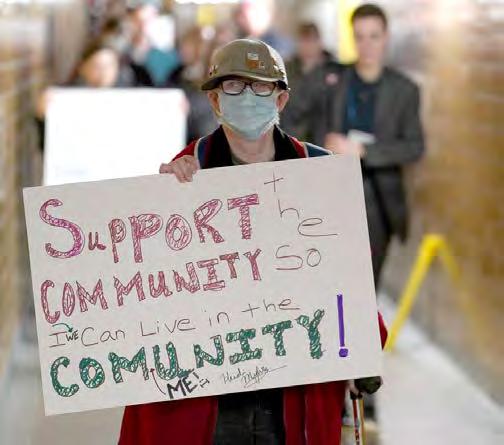
Despite a chaotic session end; many gains are celebrated
It was win some and wait until 2025 for the disability community, as the Minnesota Legislature’s 2024 session came to a tumultuous end. Chaos erupted in the House and Senate chambers before the gavels fell at the midnight May 19 constitutional deadline.
What generated the most angst was a 1,430-page bill that was a melding of nine separate bills. Republicans loudly decried the tactic of introducing such a lengthy bill so late in the session, shouting “Follow the
rules!” and “Tyranny!” and even chanting “U-S-A!”
Disability advocates and organization staffers were still poring through legislation as May came to an end. The time crunch at session’s end didn’t allow for detailed overviews of the bills as they were voted on.
Still, some losses were all too clear. A bonding bill didn’t pass, meaning a wide range of infrastructure improvements must wait. That includes needed accessibility
SESSION To page 6

Key retirements coming Page 3
Happy birthday, Dowling! Page 2
Play ball! And bowl! Page 4
Remember D-Day Page 5
Be a Partner Page 12
Read COVID-19 stories Page 7-9


He draws on experiences with autism for performances
by Jan Willms
Anxiety, restlessness, being a superpower and feeling free and unchained are some of the emotions St. Paul actor Michael Wolfe experiences while waiting for a bus.
Wolfe, who identifies as a Black, queer performer with autism, will share the feelings he goes through on a daily basis at a performance June 2 at the Parkway Theater, 4814 Chicago Ave. S., Minneapolis.
“Thresholds: Art, Science and Neurodiversity” will offer two short films and a live performance featuring Wolfe. Neuroscientist Guadalupe Astorga will talk about her research on the neurodiversity of visual perception. Both Wolfe and Astorga will share insights about their unique processes. The event is being presented by Beth Graczyk Productions (BGP). Graczyk is the director.
Wolfe said he has wanted to have a career in movies and television since he was a child watching Batman films. “The one starring Michael Keaton, as well as other movies, sparked my interest in acting,” he said. “Every time I watched a movie that I loved, I told myself that I could do that some day. Unfortunately, I was born on the mental disability spectrum with autism, so all of a sudden I had a problem. How could I get a

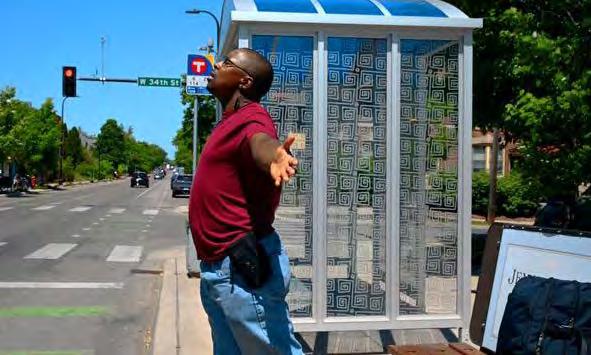
career in the entertainment industry, when no one wanted to work with someone on the spectrum? It was kind of a curve ball thrown to me.”
Wolfe also said that he has been singing his entire life. “When I was a kid I would sing to
myself all the time,” he said. “It would often annoy others around me. I was very introverted and kept to myself. But then I joined the choir in high school and began to take singing more seriously. I thought maybe I could have a career

NONPROFIT ORG. U.S. POSTAGE PAID TWIN CITIES, MN PERMIT NO. 4766 Volume 35, Number 6 WWW.ACCESSPRESS.ORG June 2024
MINNESOTA COUNCIL ON DISABILITY SUBMITTED PHOTO
PERFORMANCE To page 13 COVID-19 STORIES FROM OUR DISABILITY COMMUNITY NEWS DIGEST
Michael Wolfe's latest performance draws on his waits for the bus.
A consistent message this session was for community supports and services.

EDITORIAL
Don't pass us by when it
Having a safe, walkable, pedestrian-friendly neighborhood is a goal most of us share. Such a goal is often found in community comprehensive plans. It’s a goal most if not all of us can enthusiastically support.
The caveat with so many community goals bring to mind the old adage that one person’s ceiling is another person’s floor. Living together in community can bring forward conflicting needs as we strive toward the same goals.
That is the case with drive-through services. Drive-through services often conflict with the goal of a pedestrianfriendly community. Too many of us have had the experience of walking or wheeling along, only to have a near-miss with a vehicle entering or exiting a drive-through lane. The lanes all too often lack visibility features such as mirrors or sight lines that keep people on the sidewalks safe.
Those of us with mobility issues find ourselves dodging vehicles that enter and exit drive-through lanes. The size of many vehicles today makes it harder for motorists to see us if we are using chairs, walkers or scooters to get around.
Yet for many of us in the disability community drive-throughs help us live more independent lives in our home areas. We use drive-throughs to get our medications at pharmacies and to obtain some of our meals and beverages. We use drive-throughs for our banking needs. We may also use drive-throughs to pick up dry cleaning, get other goods, and have other services provided.
Many cities have banned new drivethrough services in recent years, citing their conflicts with walkable neighborhoods. Greenhouse gas emissions generated as motor vehicles idle in line are another issue such bans address.

Minneapolis’ Dowling Elementary in May celebrated the school’s centennial with an open house event. Many alumni and current and former faculty and staff members returned to remember their school days and reflect upon their unique experiences at the south Minneapolis school
Dowling is one of the Upper Midwest’s oldest public schools for students with physical disabilities. It is named for Michael Dowling.
Longtime Access Press History Note author Luther Granquist told Dowling’s story in a 2010 article, describing his remarkable rise from a young boy on his own to respected statesman.
The 1880 census report for Wergeland Township in Yellow Medicine County gave 14-year-old Mike Dowling’s occupation as “herding cattle.” Although he was listed with the Isaac Anderson family who farmed just
We at Access Press have a familiar plea for St. Paul city officials: Don't forget us. We are pedestrians with disabilities who need safety. We are also consumers who need access to goods and services. Losing that access makes it harder for us to stay in our communities.
St. Paul is the latest city to consider revisions to its drive-through services regulations. Our May issue featured a story about the proposal. A public hearing before the St. Paul Planning Commission is set for June 7 at the St. City Hall/Ramsey County Courthouse.
The Planning Commission’s recommendations go to the City Council for a final public hearing and vote this summer. Changes could take effect this fall.
We appreciate that St. Paul in recent years has had very challenging issues with a couple of Snelling Avenue businesses. One was a Starbucks drive-through service that tied up a very busy intersection. Long traffic back-ups and a blocked sidewalk and bike lane presented problems. Off-duty police officers had to direct traffic during business times. The business earned the
nickname “Carbucks.” Its Snelling-Marshall intersection was nicknamed “Snarlshall” in honor of snarled traffic. That drive-through has been removed.
Another business with drive-through challenges is a Taco Bell in the Midway area. That fast-food restaurant typically has long lines of cars at meal times and at bar closing time. It’s been a huge disruption for neighbors and Snelling traffic. Taco Bell took the city to court and won in its quest to rebuild its Snelling restaurant. The restaurant owners were able to retain its drive-through service.
We appreciate that St. Paul has considered a more nuanced approach to how it regulates drive-through services. In its initial recommendations, city officials didn’t propose banning new drive-through services outright as other cities have done. But now
some neighborhood district councils are calling for a ban on any new drive-throughs. St. Paul officials are trying to get ahead of potentially more demand for drive-through services, as some grocery stores and big-box retailers in other cities have added drivethroughs. It’s a huge convenience and for many of us with mobility issues, it makes shopping much easier. Could that become a service where vehicles idle in line to wait for purchases?
One proposal on the table would ban new drive-through services in some parts of St. Paul and still allow such services in other areas. Existing drive-through services would be grandfathered in.
The downtown central business district, which is increasingly becoming more residential, is a place where new drivethroughs would be banned outright. Areas zoned for traditional neighborhoods mixed use would have new drive-throughs limited to banks and pharmacies.
A number of technical design changes are proposed to keep pedestrians safer. These changes would allow space for vehicles to line up or “stack” as they wait for service. That could deter the problem of vehicles backing up and blocking sidewalks. We at Access Press have a familiar plea for St. Paul city officials: Don’t forget us. We are pedestrians with disabilities who need safety. But we are also consumers who need access to goods and services. Losing that access makes it harder for us to stay in our communities. Consider how to balance these needs. Help us stay in our home communities and help us stay safe.
Learn more about the St. Paul study at https://www.stpaul.gov/departments/planningand-economic-development/planning/currentactivities
northeast of the town of Porter, Dowling worked for himself, as he had done since his mother died when he was 10.
At that time, Dowling moved with his father from Massachusetts to St. Louis and Chicago. Then on his own he went to work as a cook in a lumber camp in Wisconsin, on steamboats between St. Paul and St. Louis, as a water carrier on a farm in Cottage Grove and as a “kid cowboy” on a ranch in Wyoming.
During the summer of 1880 he collected a herd of more than 500 head of cattle from farmers in the Canby area by agreeing to care for them on the open range and to deliver them back to their owners on October 15 for $1.50 a head. He did so successfully despite a sleet and ice storm that struck on October 14 and killed cattle in other herds in the area.
Dowling was not so lucky on December 4, 1880. He hitched a ride with two farmers
on the back of a lumber wagon to go from Canby to the farm where he kept his pony. They encountered a sudden blizzard, and the horses veered into a plowed field. Dowling was thrown from the wagon, which continued on in the howling storm.
After the blizzard cleared the next morning, Dowling struggled to a farm house on frozen legs and with frozen arms. Sixteen days later three doctors amputated both of his legs and one arm.
Three years later he convinced the Yellow Medicine County commissioners that they should provide him two terms at Carlton College rather than pay a local farmer $2 per week to take care of him. That investment paid off.
The youthful cook, cowboy and cattle herder became a school teacher, a school superintendent, a member of the Minnesota

Legislature, a newspaper publisher and the president of a bank. In 1921 he spearheaded a successful effort by Rotarians to add “crippled children” to the law providing state aid for school districts which chose to serve children with disabilities.
Dowling also had a sly sense of humor. Once while checking into a hotel, he sought help removing his prosthetics. His joke about help to remove his head sent a young hotel staffer running.
Dowling School proudly bears his name
The History Note is a monthly column produced in cooperation with the Minnesota Governor’s Council on Developmental Disabilities. Past History Notes and other disability history may be found at www. mnddc.org
EDITORIAL: Editorial submissions and news releases on topics of interest to persons with disabilities, or persons serving those with disabilities, are welcomed. We reserve the right to edit all submissions. Editorial material and advertising do not necessarily reflect the view of the editor/publisher of Access Press.
DEADLINE: 15th of each month.
CIRCULATION/DISTRIBUTION: Distributed the 1st of each month through more than 200 locations statewide. Approximately 750 copies are mailed to individuals, including political, business, institutional and civic leaders.
SUBSCRIPTION: Free and accessible to anyone in MInnesota, visit www.accesspress.org to subscribe. ABOUT ACCESS PRESS: A monthly newspaper published for persons with disabilities by Access Press, Ltd.
POSTMASTER: Send address changes to Access Press, PO Box 40006, Industrial Station, St. Paul, MN 55104-8006
INQUIRIES AND ADDRESS CHANGES should be directed to: Access Press, PO Box
Director Tim Benjamin (2001-2020)
JUNE 2024 Volume 35, Number 6 Pg 2
Paul,
Editor ............................................................................................................................................................................................ Jane McClure Board of Directors Tim S. Benjamin, Mark Daly, Brendan Downes, Catherine Hunter, ................................................. Jane Larson (Chair), Brandon Miller, Lynda Milne, Manley Olson, John Tschida, Kay Willshire Business Operations and Advertising Manager Mary Graba Advertising Sales .......................................................................................................................................................... Katarina Mulheran Production In-Fin Tuan Digital Production Tricia Donovan, Scott Stadum Website: accesspress.org email: access@accesspress.org phone: 651-644-2133
40006, Industrial Station, St.
MN 55104-8006; 651-644-2133; email: access@accesspress.org Website: accesspress.org
Co-Founder/Publisher Wm. A. Smith, Jr. (1990-96) Co-Founder/Publisher/ Editor-in-Chief Charles F. Smith (1990-2001) Editor-in-Chief/Executive
Elementary,
honored
Dowling
its namesake
at centennial fete HISTORY NOTE
to the drive-through service issue
comes
After 45 years’ service, Rise’s Noren announces upcoming retirement
One of Minnesota’s longest-tenured disability service leaders is winding up her career. Lynn Noren, President and CEO of Rise, has announced her retirement after 45 years of dedicated service.
In announcing her plans, Noren said, “I wanted to share with you that I will be retiring from Rise, likely by the end of 2024. I have been working with the Rise Board of Directors for some time to plan for my retirement, so while this news is now being shared publicly, it’s important to know we’ve been planning for the transition for a while. This year, I will celebrate 45 years of service to Rise---that’s a long run! I have loved every minute of my tenure, and I will forever be inspired by the work of this incredible organization.”
The change will mark the first leadership transition at the Twin Cities-based disability services provider in more than a decade. Noren will be retiring when a new leader is in place. The Rise board is working with a national search firm to recruit qualified candidates. Updates can be found at r ise.org/ ceo-transition/.
Since 1971, Rise has provided employment and enrichment services to people with disabilities and other challenges in the Twin Cities, Greater Minnesota and Western Wisconsin. Rise serves more than 2,500 people annually and connects them with the right job, a safe place to call home, and oneof-a-kind growth and support.
Noren began her career as an intern with Rise in the 1970s. She has held various positions within the nonprofit before assuming the top leadership role in 2013. She is an ardent supporter of disability employment and community-based support services across Minnesota and Wisconsin. She has held leadership posts in disability organizations.
Noren has also been a tireless advocate
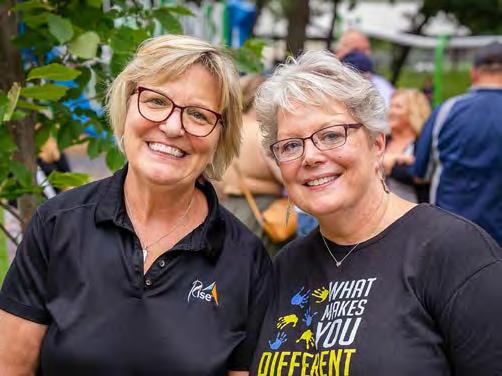
at the Minnesota Legislature, ensuring all Minnesotans are represented in policy and budget decisions.
"In many ways, I grew up at Rise at the same time Rise was ‘growing up,’ and I treasure that experience," she said. "I feel so fortunate to have worked closely with the exceptional people we serve, their families, our incredibly talented team members and community supporters."
Under Noren’s leadership, Rise successfully navigated a merger with East Metro and Wisconsin-based ESR in 2019. She guided the organization through the challenges posed by the Coronavirus
pandemic, which resulted in a shutdown of support services and staffing furloughs.
Since then, she has worked to expand both employment and life enrichment disability services in new and innovative ways that increase community visibility. Rise also recently transitioned center-based work programs to community-based jobs.
Rise recently opened new administrative offices in Fridley.
Noren said there are professional and personal reasons for her to step down.
“Together, we have made great progress to advance our programs and services as well as Rise’s administrative capabilities in my time

as president and CEO. That collective work will support Rise’s future so I feel confident that a new leader will join us at a time that is ripe for developing future strategies for the organization.”
She is working with the organization board on a smooth transition, with a search firm hired to assist. “I am committed to be involved as long as is needed to support the new leader,” Noren said. Updates on the process will be shared.
“I plan to stay involved with Rise in the future, cheering the organization on as a valued supporter.
Retirement will give Noren the opportunity to do new things. “Personally, I have learned in life that some people don’t get the opportunity to enjoy a robust retirement, and I really want to enjoy that phase of life. I have retirement goals that will hopefully allow me more time to travel, work in my gardens and volunteer in the community. My family is also very important to me, and I’ll be able to spend more time supporting them in my retirement.”
The Arc Minnesota's Andrea Zuber is stepping down at end of June
The Arc Minnesota has announced that Andrea Zuber will be leaving her role as CEO effective June 30.
Over the past five years, Zuber has led the Arc Minnesota with vision and dedication, culminating in significant achievements and transformative initiatives. She supported the organization in implementing the merger of several local chapters, solidifying it as a statewide organization supporting people in the West Central, Midstate, Metro, Southwest and Southeast regions of the state. That was a historic change for services for people with intellectual and developmental disabilities statewide.
Her accomplishments include the stabilization of programs and services, streamlining operations and expanding equitable access to support across the state. Her strategic approach to fundraising and development has secured vital grants, ensuring the sustainability and growth of our mission-driven work. Under her
RIDESHARE
From page 3
Drivers must earn at least $5 per trip. If a driver has a wheelchair-accessible vehicle, the driver is entitled to an additional 91 cents per mile.
The rates are tied to inflation going forward.
Eid Ali, president of the Minnesota Uber/ Lyft Drivers Association (MULDA), called the measure a victory for drivers, although many MULDA members preferred the Minneapolis proposal. MULDA represents drivers, who have worked for higher pay in Minnesota since 2022. Drivers filled the capitol hallways during the session, calling for the measure to be passed.
A Minnesota Department of Labor and Industry study found that 50 percent of Uber and Lyft drivers in the Twin Cities metro area earned $13.63 per hour or less while driving. In the rest of Minnesota, 50 percent of Uber and Lyft drivers earned $8.12 per hour or less.
In Greater Minnesota, where only about 5 percent of TNC rides are taken, drivers are
 Andrea Zuber
Andrea Zuber
not assured of earning the state minimum wage. Drivers there spend more time driving to pick up their riders, and waiting for fares. So how will things play out? That remains to be seen. Drivers and their supporters are waiting to see if scholarship programs, a community center for drivers and other amenities, will be restored or retained.
Uber and Lyft will stay. But they faced increased competition from other rideshare companies. Several companies, including startups and veteran TNC companies from other cities, announced this spring that they are interested in coming to Minneapolis and the rest of Minnesota. Those companies must go through city review and approval processes before they can be licensed to operate here.
Taxi companies in Minneapolis were poised to take on more riders had Uber and Lyft left. But the TNCs have already provided strong competition for traditional taxi companies, to the point where Minneapolis alone has few taxi companies left that are based in that city.
St. Paul has also lost traditional taxi firms, as has Bloomington. St. Paul riders with
guidance, the organization created a modernized, unified, statewide vision and a corresponding values framework. Andrea’s commitment to disability justice and equity has positioned the Arc Minnesota as a leader in disability justice, earning the entire organization recognition for its advocacy and impactful programs.
“It has been an honor and privilege to lead this organization and work alongside the staff of the Arc Minnesota and its many partners to move our mission and vision forward for the past five years,” Zuber said.
“Our values are now focused on centering the lived experience of people with disabilities, disability justice, and racial equity. Our vision is that people with disabilities belong in a world that welcomes them, where they have love, liberation, and freedom. I am so proud of what we have accomplished together.”
Her passion for disability justice will continue. Zuber plans to stay connected to
disabilities lost one of the few firms largely dedicated to medical calls and riders with disabilities when Green and White Taxi closed its doors several years ago.
the disability community, supporting the work she’s passionate about, and continuing to be an advocate for the human and civil rights of people with disabilities.
The Arc Minnesota is now beginning its search for a new CEO to lead its mission to promote and protect the human rights of individuals with intellectual and developmental disabilities (IDD). The Arc Minnesota provides essential services to support people with IDD and their trusted supporters. Disabilities may include autism, cerebral palsy, Down syndrome, fetal alcohol spectrum disorder, fragile X, Williams syndrome and other disabilities. A key focus is leadership in public policy to promote and protect human rights and community inclusion.
The Arc Minnesota Board of Directors has retained CohenTaylor Executive Search to conduct the search for its next CEO. To learn more, contact thearcminnesota@cohentaylor.com.
Another issue with taxis and their use by riders with disabilities is that taxi trips can be more expensive than rideshare.




JUNE 2024 Volume 35, Number 6 Pg 3
What are your hopes & dreams? Discover your path! Contact us today! 651-646-8342 www.mcil-mn.org Live your most independent life, follow your path! What are your hopes & dreams? Discover your path! Contact us today! 651-646-8342 www.mcil-mn.org 530 North Robert St, Saint Paul MN 55101 Live your most independent life, follow your path! Responsive PCA Choice Services Independent Living Services ADA Information & Referral Covid Community Coordination Transitional and Housing Services Contact us today! www.mcil-mn.org 651-646-8342 530 North Robert Street Saint Paul, MN 55101
Lynn Noren, left, joined a Rise supporter at an annual event.
SBUMITTED PHOTOS
Noren, left, is shown working with a client in her early years at Rise.
With Target Center and Target Field, one misses the mark on access
by Barbra Metzger
July 26, 2024, is the 34th anniversary of the passing of the Americans with Disabilities Act (ADA). It was monumental legislation intended to provide consistency of national standards in fighting discrimination against all disabled people no matter what the disability and to integrate full participation in society. Nobody expected it to be the last word or the only word on fighting discrimination. Everybody expected that some people and entities would do better than the minimum national standards, but that nobody could do less.
There are two side by side sports facilities in downtown Minneapolis that demonstrate two poles. Target Field exceeds the minimum standards. There are elevators and ramps built into the structure. There are seating areas without fixed seats for wheelchair use scattered throughout the stands at every conceivable price point. No seats are far distant from rest rooms, drinking fountains and food concessions.
Target Center is an example of a facility trying to do less than the minimum national standards. It was closed for remodeling in 2017. The remodeling design was approved by the
building owners, the City of Minneapolis, to allow a configuration for basketball used by the Timberwolves and the Lynx that is in direct violation of the ADA. The ADA (Sec 12183, 2) spells out that when existing facilities are altered in any way that could affect the usability of the facility, it must be done in such a manner that to the maximum extent feasible the alterations are readily accessible and useable by individuals with disabilities. Target Center has done the opposite.
The ADA guarantees the accessibility of every seat in the Target Center in a manner appropriate to the individual’s needs. Target Center was designed and built for fans to enter the seating area at two levels, ground level where the court is, and from the concourse with food concessions between the top of the seating section and the upper tier of seats.
The Timberwolves/Lynx configuration for basketball after the 2017 remodel makes all the area of the ground level floor an exclusive zone for use only by patrons who can afford “courtside” seats, eliminating access to lower rows of seats from below. The Timberwolves/ Lynx require all fans with seats in lower rows (out of 20) to “use entry and exit methods allowed by [Timberwolves/Lynx] policies”. The
only method to enter and exit any seats from row A to row T is by going down 40 cement stairs. Going down means going up again to exit at the game’s end, or to use a rest room or get food or drink. There are no other methods allowed.
The Timberwolves have declared row U, the row behind fixed seating at the top of the bowl on the food concession concourse level, “ADA Designated Seating” and “ADA Accessible Seating”. They refer to all other fixed seats in the entire arena as “non-ADA Accessible Seating”. They want to limit everyone with any mobility limitation to that one row of seats. Out of a capacity of 20,000 only one row of seats for any person with any adaptive devices such as wheelchairs, walkers, crutches, arm extension supports or canes, must sit in one row . . . or maybe one or two from the top down two to four steps if they can physically do that, but nothing closer to the court at all. This scheme is in direct contradiction of the ADA.
There was a public hue and cry immediately after Target Center reopened in 2018. A civil rights complaint was filed with the City, calls, letters, and meetings followed. City officials and the Timberwolves agreed to allow disabled season ticketholders to enter seats from ground
level. The agreement worked well for two Lynx seasons but was never implemented for Timberwolves games or for single-game seat purchasers.
After the two-year Covid interruption the Timberwolves/Lynx are pretending the agreement never happened. The Minneapolis Civil Rights Departments says it has no documentation of the 2018 outcry and agreement.
Why not?
If you’re tired of being stuck off in a corner because you or your companion can’t climb stairs or stand and walk call/email Minneapolis City Council members and Civil Rights department staff at 311 and press the point. That treatment of disabled people is illegal, and they must stop it now for anyone who attends any game, season ticketholder or single game ticketholder. Period.
Call U.S. Senators Amy Klobuchar and Tina Smith and your U. S. Congress member as well. The ADA is federal law, and the City of Minneapolis breaks it at every Target Center basketball game.
Barbra Metzger is a Twin Cities disability rights advocate and sports fan.
Never forget the human cost as the D-Day anniversary is marked
by Jane Larson
On June 6th, 2024, we mark the 80th anniversary of the D-Day invasion in Europe. While we rightfully commemorate this milestone as the beginning of the liberation of Europe, we must never forget the toll of human suffering as the price paid for victory: not just those who lost their lives, 4,415 in the first 24 hours, but also those whose lives were changed forever. A vast community of people returned with disabilities, lifelong physical and mental changes, to a world that was no longer accessible to them.
As of 2023, the number of World War II veterans in the U.S. was estimated at 119,550 and few people living today remember the war. WW II began in 1939 when the Third Reich invaded Poland without any notice or provocation. Many did nothing, thinking the takeover would stop at Warsaw. It did not. The United States entered the war in 1941, first after the attack on Pearl Harbor by Japan and then in Europe. We can’t forget because those who forget history are condemned to repeat it.
During WWII people with disabilities were targeted for what the Nazis called a euthanasia program that was separate from its racist and ethnic “eugenics.” Those with physical and mental disabilities did not measure up to the Nazi idea of a ‘master race’. Euthanasia, a Greek derived word meaning a good death, meant killing by gas chamber, injection, or starvation. About 200,000 people with disabilities were murdered

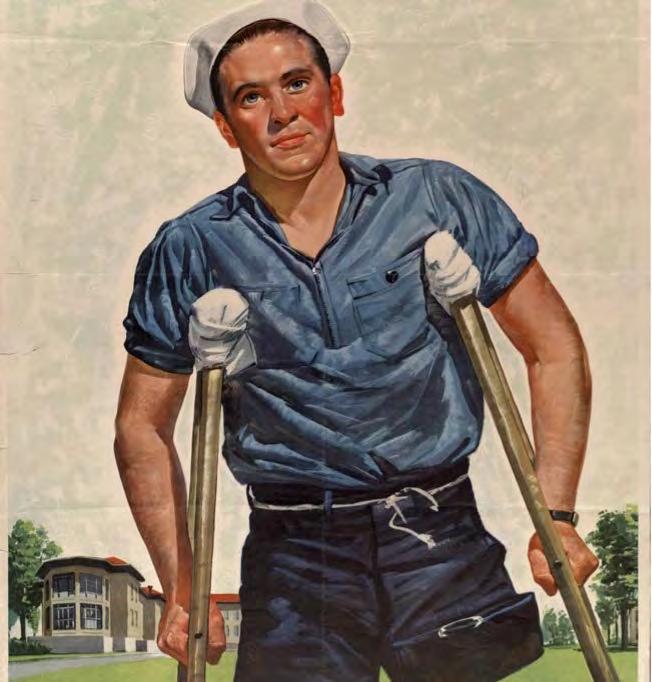

labor shortages. This included people with disabilities, women, people of color, and people who lived in the intersection of those identities. According to an article by Jade Ryerson, Consulting Historian with the Cultural Resources Office of Interpretation and Education, with support from vocational rehabilitation training programs, both industrial and support jobs opened to people with congenital and acquired disabilities. Many of these jobs supported the war effort and involved considerable risk. Unlike civilians with disabilities, disabled veterans found it much easier to acquire jobs after the war. In addition to receiving military pensions, the GI Bill streamlined access to education and home ownership for veterans and their families. Civilian workers with disabilities were displaced and did not qualify for benefits.
Moreover, as job expansion slowed down, people with disabilities often found themselves “last hired, first fired.” This led organizations like the American Federation of the Physically Handicapped and Blind Veterans Association to speak out for equal access to public transportation, education, and jobs. It took a few decades but resulted in the civil rights acts of the 1970s.
While researching this topic, I recently visited the Minnesota’s Greatest Generation Exhibit at the Minnesota History Center. It follows the lives of people through the Great Depression, WWII and the Post War Baby Boom. It includes the opportunity for visitors to board the fuselage of a C-47 where patrons experience a multi- media re-recreation of a true and tragic combat jump story on D-Day. A veteran who is also a mental health professional introduced the program to our tour group. To say it was a
JUNE 2024 Volume 35, Number 6 Pg 4
D-DAY To page 5
Adapted softball teams, team and solo bowlers competed for state titles
Spring sports are winding down for Minnesota prep athletes with disabilities, as the Minnesota State High School League held two tournaments in May. Adapted softball players competed at Chanhassen High School. Bowlers flocked to Bowlero in Brooklyn Park.
Track and field athletes compete in June.
In Minnesota’s prep adapted sports world CI teams are for athletes with cognitive disabilities. PI competition is for physically disabled athletes. ASD athletes are on the autism spectrum.
In bowling singles, doubles and team championships were awarded in ASD, CI and PI division.
In the ASD Division, St. MichaelAlbertville junior Ashley Arroya Flores placed first in girls’ singles with 508 pins. Austin senior Espy Chigo and JanesvilleWaldorf-Pemberton/Waseca sophomore Jasmyn Villafuerte battled for second place with Chigo coming out on top with 445 pins. Villafuerte finished two pins behind at 443. Cambridge-Isanti ninth-grader Thomas Iserman captured the boys’ individual singles crown with a score of 486 pins. Simley ninth-grader Rafe Sporer was runner-up with 469 and Lake Crystal Wellcome Memorial seventh-grader John Perrin was third at 462.
The Zimmerman duo of eighth-grader Jason Metress and junior Ciaran Hester rolled their way to a state championship with a combined score of 891. The North High School-North St. Paul team of senior John Oddaiwi and sophomore Leonidas (Leo) Yang were the runners-up with a score of 880. Anoka-Hennepin was third with 876 behind senior Griffin Monson and junior Shai Hargest.
North High School-North St. Paul cruised to the team championship with a combined 1,751 pins. Team members included sophomore Leonidas (Leo) Yang, junior Dylan Vue and seniors John Oddaiwi and Nathan Sveen. Tartan was the team runner-up with 1,696 pins and Lake Crystal Wellcome Memorial was third at 1,666.
In the CI Division, Anoka-Hennepin sophomore Fherlish Ann Constantino rolled to the girls’ singles championship with a two-game score of 471. Two seventhgraders rounded out the top three finishes: Zimmerman’s Jordyn Genrdeau finished with 453 pins and Anoka-Hennepin’s Lila Hall followed with 446.
Lester (Travion) Johnson, a senior at North High School-North St. Paul, topped the field in the boys’ singles competition with a two-game score of 495. That was 41 pins better than St. Paul Johnson ninth-grader Kevin Lao, who was runner-up with 454. Goodhue County senior Caden Stumpf placed third with 444 pins.
Anoka-Hennepin’s Fherlish Ann Constantino, a sophomore, and ninthgrader Joel Wamberg, won the doubles championship with a two-game combined score of 889. Tartan’s Joshua Thompson, a
D-DAY
From page 4
jolt of reality would be an understatement. We came to understand the human cost and true horrors of war. We learned about the near disaster that occurred on D-Day and the sacrifices in life, limb and mind that were the result. We learned of the lifetime effects on many who serve in war. We learned about what is known as PTSD today, and the reasons behind the suicide rate among veterans. According to the American Psychiatric Association, , veterans are 1.5 times more likely to die by suicide than nonveterans. Reasons include high exposure to trauma, stress and burnout, isolation and loneliness, easy access and familiarity with guns, and difficulties reintegrating into civilian life.
We still have a job to do. I am from Iowa where the state motto is “Our liberties we prize and our rights we will maintain.”
When it comes to civil rights for people with disabilities, we must maintain the same spirit.
General Dwight Eisenhower, who led the D-Day invasion, hated war. Years after the end of WWII, he gave a speech with the
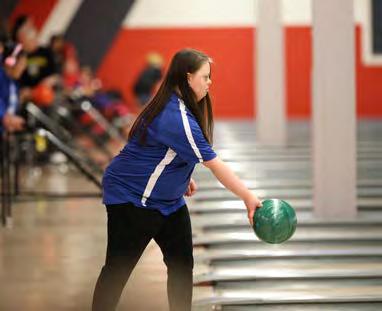
senior, and junior Jameer Patterson were second at 887. Detroit Lakes juniors Aiden Hamar and Ruthy Davis placed third with a score of 850.
Zimmerman won the CI team competition with 1,715 pins. Scoring for the Thunder were seventh-grader Isaac Barr, eighthgrader Fynn Spitzmuller, sophomore Lucas Stoltman and junior Alex Maas. A second Zimmerman team placed second with 1,690 pins. North Branch Area placed third with a score of 1,658.
In the PI Division, ninth-grader Rosaria Valles of North High School-North St. Paul emerged as the state champion in the girls’ singles competition with a two-game score of 501. Stewartville junior Allie Peterson was second with a score of 477. Goodhue County sophomore Emily Tiedemann claimed thirdplace honors with 450 pins.
Cambridge-Isanti junior Samuel Price captured the boys’ singles title with 494 pins. Mankato East ninth-grader Kenny Smith and Winona sophomore Alex WindleyDaoust placed second and third, respectively. Smith had a score of 488 and Johnston finished at 473.
North High School-North St. Paul grabbed the top spot in the doubles division. Senior Lucas Eide and ninth-grader Rosaria Valles combined with a score of 938 to win the title. St. Michael-Albertville seventh-grader Jacob Centko and ninth-grader Dylan Cummings teamed up for a runner-up total of 857. Goodhue County sophomores Emily Tiedemann and Miguel Quintanilla placed third with 850 pins.
Tartan had extra luggage for its drive home after rolling to the team championship with a total of 1,706 pins. Ninth-grader Eh Hser Gay, sophomore Charlotte Chitwood, junior Louie Romero and senior Ali Milan were the members of the winning team. Wayzata/Minnetonka was the runner-up with 1,591 pins and North High School-North St. Paul placed third with 1,586.
following sentiment, engraved in the marble wall at his Kansas gravesite:
“Every gun that is made, every warship launched, every rocket fired signifies in the final sense a theft from those who hunger and are not fed, those who are cold

Hawks take both crowns
The Dakota United Hawks won the crown in both adapted softball divisions for 2024. The CI team finished with a record of 10-1 and the PI squad came in with a perfect record of 10-0.
Both Hawks teams were runners-up in 2023.
In the CI division championship, Dakota United broke through against the three-time defending champions from Burnsville/ Farmington/Lakeville. The Hawks defeated the Blazing Cats 5-4 to claim their first-ever CI crown.
Sophomore infielder Myles Johnson, junior catcher Henry Eisele and senior catcher Jeffrey Rosga each had two hits for Dakota United. Junior outfielder Makai Smith accounted for the Hawks’ lone RBI. Senior infielder Riley Deutsch had four hits in four at-bats for Burnsville/Farmington/ Lakeville. He also scored one run and added one RBI.
The third place game was a high scoring tilt. The New Prague Trojans topped Osseo 13-10. Junior infielder Tryston Seger scored four runs for New Prague. Senior pitcher Alec Singh and senior catcher Saniya Green notched two runs apiece for Osseo.
St. Cloud Area topped South Washington County, 8-6, for the consolation championship. Seventh-grade infielder Isaiah Kuschel and senior infielder Logan Anderson each had two runs for the winning Crush. South Washington County put up four runs in the fifth inning, including one from junior Logan Yannarelly. Yannarelly finished the game with a team-high two runs.
Other teams in the tournament were Chaska/Chanhassen and South Suburban.
CI all-tournament team members are Peyton Chlebecek, South Washington County; Anderson, St. Cloud Area; Singh and Jake Dettermann, Osseo; Seger and Elliot Soukup, New Prague; Clarke Ruhland,
and are not clothed. This world in arms is not spending money alone. It is spending the sweat of its laborers, the genius of its scientists, the hopes of its children. This is not a way of life at all in any true sense.”
Note: Jane Larson is the proud daughter of


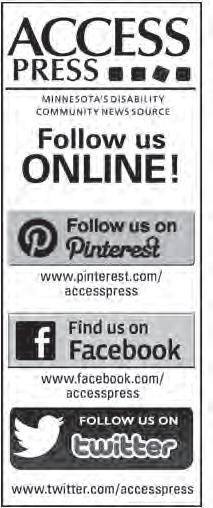
Caden Roseth and JT Koczer, Burnsville/ Farmington/Lakeville; and Kyle Jacobson, Colin Price and Mark Manwarren, Dakota United
The PI title game was close as Dakota United beat Robbinsdale/Hopkins/Mound Westonka 5-4. It was the Hawks’ second PI championships win in a row over the Robins and the third consecutive championship for Dakota United. The Hawks also won in 2006, 2008, 2016 and 2020.
Junior pitcher Cayden Needham and junior outfielder Reece Martin accounted for Dakota United’s two RBI. Martin also notched a double for the Hawks. Senior pitcher Jayda Johnson led Robbinsdale/ Hopkins/Mound Westonka with four hits and three runs scored.
Rochester earned third-place honors, defeating the Minneapolis South Tigers 11-3. Seventh-grade outfielder Sawyer Hanson and junior outfielder Braxton Small scored three and two runs, respectively, for the Raiders. Sophomore outfielder Jorge RosasBravo, senior pitcher Nick Staloch and senior outfielder Eric Sawyer scored one run apiece for Minneapolis South.
The Osseo Orioles met the St. Paul Humboldt Hawks in the consolation final, with the Orioles coming away with a 13-2 victory. Osseo scored five runs in the third inning and pitcher Evan Bartlett finished the game with three runs.
Anoka-Hennepin and South Suburban were also in the tournament.
PI all-tournament team members are McKenzie Green, St. Paul Humboldt; Bartlett, Osseo; Staloch and Rosas-Bravo, Minneapolis South; Andrew Westerman and Small, Rochester; Jayda Johnson, Nick Johnson and Jose Leon Estrada, Robbinsdale/ Hopkins/Mound Westonka; and Amisha Etter, Needham and Martin, Dakota United.


JUNE 2024 Volume 35, Number 6 Pg 5
civil
HANDI MEDICAL SUPPLY T MANKATO
a WW II veteran, a man who believed in
discourse over conflict. Jane currently serves as president of the Access Press Ltd Board of Directors.
Be part of our Access Press Directory Next edition: July 2024
SMUGMUG
Bowling offers three classes for prep athletes.
Adapted softball games were played at Chanhassen High School.
Hoped-for capitol complex tunnel renovations face an uphill battle
by Michelle Griffiths
In the 2024 session, the Minnesota Legislature considered borrowing $8.5 million to renovate the pedestrian tunnel that connects the capitol and the State Office Building — which houses the offices of the 134 members of the House and some widely used committee rooms — to make it compliant with the federal Americans with Disabilities Act (ADA).
The current slope has a grade of more than 10.5 percent, which exceeds the ADA’s permitted grade of 8.3 percent.
The Department of Administration’s bonding request cites the tunnel’s steep slope, which makes traversing the Capitol campus virtually impossible for people with disabilities without a powered wheelchair, especially during the winter months.
This cost is on top of the $454 million Minnesota borrowed last year — before interest — to fund the State Office Building’s renovation, which is underway and scheduled to be completed in time for the start of the 2027 legislative session.
The tunnel renovation includes construction of a new 15-by-85 foot section adjacent to the existing tunnel. This new section will include an ADA-compliant slope and a new elevator that will assist pedestrians between the new ADAcompliant tunnel and the basement of the capitol building.
In 2021, lawmakers created an account to fund the renovation of the State Office Building, but the statutory language did not include renovation of the tunnel. Therefore, the tunnel renovation needs to be approved separately.
House Majority Leader Jamie Long (DFLMinneapolis), said it was “probably an oversight” for lawmakers to omit the tunnel
Capital projects vying for state bonding dollars may have to wait for 2025 or 2026, if a special legislative session is not called this summer.
On May 19, the final day to pass legislation, House members pushed through a $900 million bonding package. But their counterparts in the Senate ran out of time before the clock struck midnight.
As Access Press went to press, it wasn’t initially clear if a special session to deal with bonding would be called by Gov. Tim Walz. The governor had called bonding his “big show for this legislative session." No special
improvements around the state.
Efforts to get a state Equal Rights Amendment (ERA) on the November 2026 ballot fell short as the clock ran out in the Senate. The current version of the ERA includes protections for people with disabilities.
The ERA was a flash point throughout the session, with 14 ½ hours’ debate in the House during the session’s final hours. Language on abortion access and gender identity caused the most controversy.
ERA supporters immediately called for a special session, an idea rejected by Gov. Tim Walz.
One frustration for many disability advocates was the failure to definitively sunset subminimum wages paid to people with disabilities. A task force recommendation is on the table to end the practice by August 1, 2025, with a phased implementation period. A measure passed the House but stalled in the Senate.
Since the 1930s, employers have been allowed to pay disabled workers a lower wage. Most often used in workshop setting, subminimum wage supporters contend that without such programs, some people wouldn’t have work at all.
Advocates wanted more progress on eliminating the pay practice, arguing that gains in training and support services have made it possible for people with disabilities to pursue careers of their own choosing. The Disability Wage Justice Coalition will work on the measure for 2025.
Another closely watched proposal that didn’t reach the finish line was medical aid in dying, or the end-of-life options act. Both sides ran high-profile campaigns for and against physician-assisted suicide.
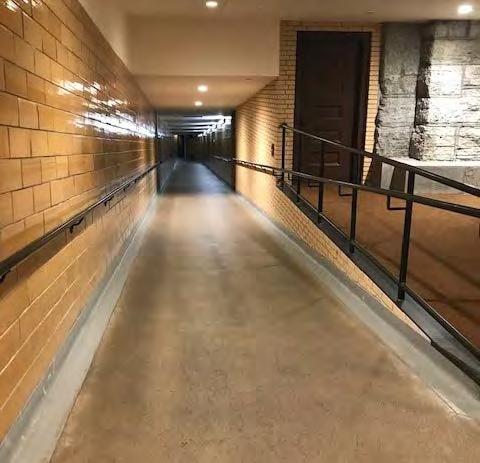
from the State Office Building renovation.
Long said that his colleagues many times over the years had to push former Rep. Rod Hamilton (R-Mountain Lake), up the tunnel’s steep slope in his wheelchair so he could make it to the House chamber for votes.
session will be held.
Even-numbered years are typically bonding years in Minnesota.
Earlier in the session Walz brought forward a $982 million public infrastructure plan. That’s much smaller than the $2.6 billion bonding package approved in 2023. The 2023 bonding package set a state record. Improvements to state facilities, an array of housing projects including accessible and supportive housing, new facilities, access accommodations and assets preservation were projects vying for bonding support in 2024.
The bill made progress in the House but not in the Senate. Versions of the bill have been at the capitol for more than a decade.
But there were accomplishments to celebrate. The Mental Health Network and NAMI Minnesota were pleased so see many initiatives approved. Go to http://namimn.org/ recent-legislative-initiatives to read a report on everything passed.
A huge focus for mental health advocates is to find more funding to cover the costs of care, to address the state’s mental health crisis.
For the Minnesota Consortium for Citizens with Disabilities (MNCCD), the results were mixed. Trevor Turner, who leads efforts at the capitol for the Minnesota Council on Disability and MNCCD, said work will start right away on 2025 legislative requests. He said that despite the session’s chaotic end, those who worked on legislation this session should feel positive about what was accomplished.
“I think we have a lot to be happy about,” he said.
Sean Burke, who leads intergovernmental relations work for MNCCD and its agenda, agreed. He said gains should be recognized. So should efforts to prepare for 2025, which is a budget year.
Work that will be ongoing includes scrutiny of Medical Assistance income and assets limits, and reforms for Medical Assistance for Employed Persons with Disabilities.
Progress was made on personal care attendant (PCA) and homecare worker measures championed by advocate Damon Leivestad, including work on enhanced rates and worker benefits. A big win here is that direct care staff can now provide services when a client is hospitalized.
Many other measures supported by disability service organizations did pass, ranging from accessible prescription bottle labeling to standardizing disability parking signs to
Long also said he’s invited family members to tour the State Office Building and the capitol, but some had difficulty making it up the tunnel’s steep slope. They had to stop and catch their breath multiple times, he said.
“It was a real barrier for them to be able
Improving accessibility at Minnesota Department of Natural Resources (DNR)managed lands and facilities had a $2 million price tag, to build up work started in past years. Some state parks and wildlife management areas still have access needs.
The long list of projects competing for funding at the start of session also included design requests for the state academies in Faribault. The Minnesota State Academy for the Deaf (MSAD) sought a new student center, with $300,000 to replace up to five older campus buildings with a single center.
Pre-design funding was also sought
get rid of the word “handicapped.” Needed clarifications for service animal use passed, to broaden the definition of disability and provide the legal right to have a service animal.
A big win is a first-of-its-kind law that will promote teacher training on the disability justice movement and ableism. The work will be led by people with disabilities. It is seen as a way to create cultural competence on disability issues. It is celebrated especially by advocates on the autism spectrum. A goal is to represent disability as a culture rather than a medical condition.
Another positive step is amendments to the state human rights act, to including coverage for people with episodic disabilities. Episodic disabilities are characterized by fluctuating periods of wellness and disability.
Gains were also made in reform of the guardianship program. The Council on Disability will lead a task force this fall that will look at guardianship reform and what changes should be made to guardianships and conservatorships that affect Minnesotans with disabilities.
Guardianship immunity has been repealed, which is seen as providing more protection against guardianship abuse.
Another gain is the Minnesota RISE Act’s passage. RISE stands for Response, Innovate, Succeed and Empower. It focuses on accessibility and right for disabled students in Minnesota’s higher education institutions. The act is seen as improving the educational experience for Minnesota students.
A win for parts of Greater Minnesota is $24 million in aid for emergency medical assistance providers in Greater Minnesota to Minnesota’s Emergency Medical Services Greater Minnesota and $6 million for a pilot program aimed at improving EMS delivery in the northeastern parts of the state. That’s a small amount compared to the $120 million
to participate fully in what the capitol complex has to offer, so I think it is a really key accessibility point to get into the capitol building,” Long said.
Wayne Waslaski, assistant commissioner with the Department of Administration, said renovating the tunnel now — construction would begin in August — aligns with completion of the State Office Building renovation.
The tunnel is currently closed, as it’s being rerouted to connect with the State Office Building’s new addition. Minnesota House members — and the public — must walk outside and cross the street to access the capitol and vice versa.
In December 2022, former Rep. Kurt Daudt (R-Crown), during the committee hearing that gave final legislative approval to the State Office Building renovation, said he had helped push even motorized wheelchairs up the slope near the capitol.
Then House Majority Leader Ryan Winkler during the hearing said that lawmakers tried to include the tunnel renovation in with the State Office Building project, but they were told it wasn’t within the project’s “scope of authority.”
“I think it was an oversight of ours, probably, not to include (the tunnel) when we did the capitol building,” Daudt said during the hearing. The capitol renovation was completed in 2017.
House Minority Leader Lisa Demuth (R-Cold Spring) recently referenced the $8.5 million renovation to the tunnel as another example of Democrats’ “wasteful spending,” arguing it should have been included in the State Office Building renovation. This article first appeared on the Minnesota Reformer website.
for the Minnesota State Academy for the Blind (MSAB) therapy pool and related improvements. That was also for $300,000. Asset preservation was eyed for both campuses, at $1.227 million. That’s far less than the plus-$33 million in needs. Minnesota Department of Human Services (DHS) sought $12.266 million in assets preservation statewide. That’s another drop in the bucket as the statewide facilities needs tied to deferred maintained are estimated at more than $184 million.
advocates sought, but it is seen as a step in the right direction. The bill also created a new Office of Emergency Medical Services to oversee the state’s EMS network. Worker shortages have greatly affected medical response in parts of the state.
Want to know more about bills? Advocacy groups were posting agendas and results as May ended. Readers should check with the groups they are involved with.
Legislative coverage is prepared by Editor Jane McClure.




JUNE 2024 Volume 35, Number 6 Pg 6
The tunnel can be daunting for people with mobility issues.
With no bonding bill, many accessibility projects have
MINNESOTA DEPARTMENT OF ADMINISTRATION SESSION From page 1 info@truefriends.org | 952.852.0101 www.truefriends.org Programs Camp Respite Retreats Team Building Therapy and Adaptive Riding Travel Experiences and Adventures for All Abilities camp courage Maple Lake, MN camp friendship Annandale, MN Eden Prairie, MN camp eden wood info@truefriends.org | 952.852.0101 www.truefriends.org Programs Camp Respite Retreats Team Building Therapy and Adaptive Riding Travel Experiences and Adventures for All Abilities camp courage Maple Lake, MN camp friendship Annandale, MN Eden Prairie, MN camp eden wood info@truefriends.org | 952.852.0101 www.truefriends.org Programs Camp Respite Retreats Team Building Therapy and Adaptive Riding Travel Experiences and Adventures for All Abilities camp courage Maple Lake, MN camp friendship Annandale, MN Eden Prairie, MN camp eden wood info@truefriends.org | 952.852.0101 www.truefriends.org Programs Camp Respite Retreats Team Building Therapy and Adaptive Riding Travel Experiences and Adventures for All Abilities camp courage Maple Lake, MN camp friendship Annandale, MN Eden Prairie, MN camp eden wood Programs Camp Respite Retreats Team Building Therapy and Adaptive Riding Travel Experiences and Adventures for All Abilities
to wait until 2025, 2026
by Jane McClure
A recent apartment move brought challenges as well as forgotten treasures. One of the latter was a high school yearbook from my mother’s hometown of Alexander, Iowa. The 1950 Bulldogs Bark detailed the antics of a tiny rural high school.

COVID-19 STORIES

Don’t FLiRT with the latest COVID-19 variants; learn and stay safe
Those were the days of teasing yearbook writeups about fellow students. One high school boys was described as a “flirt.”
A s someone who lives with long COVID and had another bout of COVID-19 during my move, I had to remind myself that there are flirts and there are FLiRTs.
The latest set of COVID-19 variants and sub-variants making their way across the United States are called “FLiRTs.” And yes, the “i” is lowercase. As our June issue went to press, more than one in four COVID-19 cases in the United States could be linked to FLiRT.
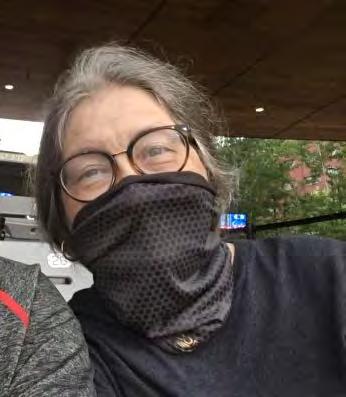
Cases and hospitalizations due to COVID-19 are down as a whole. But the virus that causes COVID-19 continues to mutate and change, with an endless parade of new variants and sub-variants. Does it feel as COVID-19 is a shapeshifting, permanent part of our lives?
It’s disheartening to learn that new variants and sub-variants may be more easily transmitted. That has sparked questions about a potential summer wave of illnesses.
So why use the name FLiRT? We’ve seen various names attached to the virus and Pirola.
A recent Today show story tells us that scientists came up with the name FLiRT this spring.
FLiRT isn’t a reference to a friendly high school student, but is based on the technical names for the variants’ spike protein mutations. That’s where the FL and RT come from. It was easy enough to add an i and coin the name FLiRT.
This is our second special section of stories from our disability community members. Access Press has worked with Minnesota Department of Health for the past several months to raise awareness
It’s disheartening to learn that new variants and sub-variants may be more easily transmitted. That has sparked questions about a potential summer wave of illnesses.
of COVID-19 and to emphasize the need for vaccines and safe practices. My hope as editor is that the information has been helpful. The back page of this special section includes what we hope are ongoing resources for readers to use. Those of us who live with disabilities are all too aware of what COVID-19 has done to our lives. Some have sustained permanent health conditions. Others have lost loved ones.
ne more note about Alexander. Years ago my sisters and I had our polio vaccines in the old school gym there. Back then we didn’t question vaccines and the science behind them. It’s very disheartening to realize that vaccine rates are still all too low and that misinformation is still being spread.
The Centers for Disease Control and Prevention reported that as of May 4, 22.5 percent of adults received an updated COVID-19 vaccine since September 14, 2023. I’m one of those adults who put off her vaccines due to busyness of work and getting ready to move, and I paid for that with several days of illness.
We people with disabilities are a much
more susceptible population when it comes to illnesses. We need to take threats to our health seriously. Those who live and work with us and who care about us need to do the same.
Access Press thanks those who shared their COVID-19 stories with us. As we did with the April special section, we’re not using real names and changing a few other details to protect identities.
Not using real names isn’t typical journalistic practice. It’s a step we don’t take lightly. We need to balance our practices with the need for our community members to have privacy. It is not easy to share what are deeply personal stories. We at Access Press very much appreciate those who agreed to speak to me and share how COVID-19 affected them and their families.
We also appreciate the many health care professionals and organizations we are able to gather information from. We especially appreciate the Minnesota Department of Health for making this coverage possible.
Stay healthy and stay safe.
Skin rashes, swollen toes and fingers were cause for discomfort
I’m Bob, a 67 and a retired mechanic.
My family and I live in the Duluth area. I still work part-time at a convenience store, stocking shelves, cleaning and doing other chores.
I myself do not have any disabilities other than mild (osteo)arthritis in my back, knees and hands. However, my family and I care for our disabled granddaughter. Evie has Down syndrome so we have be very careful when any of us become sick. She is vulnerable to illness and doesn’t understand things like social distance. I developed COVID-19 after a community event in 2023. I didn’t wear a mask and probably should have. Several other people also became ill. I’ll admit that I had not kept up with boosters and new vaccines. That was a mistake!
I stayed in a camper by our house until I tested negative. It was hard because Evie wanted to see me and didn’t understand what was going on. We talked through a window. She likes hugs but those were out of the question.
My doctor warned me about the illness and fatigue that are part of COVID-19, and to prepare for any longer-term effects. What I didn’t expect was to have skin problems. Days after I tested negative, I developed a painful skin rash.
I had measles and then chicken pox as a kid, along with my brothers and sisters. I’ll never forget my mother telling me not to scratch myself. The COVID rash reminded me of those days.
I went outside one day for some fresh air. Later that afternoon my face broke out in a rash.
I then developed what are called

“COVID toes.” My toes and fingers blew up like balloons and had dark spots. It was hard for me to do anything with my hands for several days, and hard to walk.
Part of my story is to remind people who get sick to be ready for any skin problems, and to ask questions. Make sure you and those you love do not get sick!
Skin conditions have been tracked since early in the pandemic. What is called a Morbilliform rash is a symptom that appeared early in the pandemic. It can look like a case of measles. Other skin conditions that can develop including itchy, red skin welts and small blisters.
Canker sores in the mouth can also be associated with COVID-19, as are hives.
Pseudo-chilblains or COVID toes and fingers can be very painful and can restrict movements.
Studies of the pandemic indicate that while these skin conditions and swollen digits are painful, cases of long-lasting impacts are rare. Many cases last for 10 days to a couple of weeks.
More concerning can be what are known as vaso-occlusive lesions. These skin lesions are more often seen when people are hospitalized with moderate to severe cases of COVID-19.
The American Academy of Dermatology is one of many good resources for people with COVID-19 related skin conditions. Learn more at https://www.aad.org/public/diseases/ coronavirus/covid-toes
JUNE 2024 Volume 35, Number 6 Pg 7
Jane McClure
MY COVID STORY: BOB
CHECK FOR VACCINE APPOINTMENTS Visit Vaccines.gov Search for appointments by vaccine type: Pfizer, Moderna or Novavax vaccine. Contact your primary health care provider or a local pharmacy.
FROM OUR DISABILITY COMMUNITY ISTOCK
 MY COVID STORY: JACK
MY COVID STORY: JACK
Disruptions in routine, loss of friends were struggles for young student
Jack is 12. This story is told by Susan, his mother. Their family lives in Anoka County.

Jack is on the autism spectrum. Attention-deficit hyperactivity disorder (ADHD) and depression are among his other life challenges.
We have other children but none with disabilities. Jack’s diagnosis has been a learning experience for us.
Jack has always had an individualized education program or IEP. That has been helpful for us but nothing prepared us for the pandemic.
Our entire family has had COVID-19 twice. While Jack did not have the worst symptoms, he doesn’t like to get sick. He dislikes wearing masks and very grudgingly gets his vaccines and boosters.
When the pandemic started more than four years ago, Jack was in third grade. He was doing OK until we went to full-time online learning. That was extremely hard for him. He missed his friends, his teachers and especially the paraprofessionals at his school. He didn’t like sitting in front of a monitor and felt as if he was too close to others. He remarked more than once that he didn’t like being in other peoples’ faces.
Everyone was happy when we went back to in-person learning. However, we were worried that Jack had fallen

behind. We’d had changes at our school with staffing and that also caused issues, as did the fact that some of Jack’s friends were at other schools. He was not ready for so many changes. Losing that familiar place was a big, big deal.
Middle school has been hard because . . . well, middle school is hard. Kids are often mean and bully Jack.
We tried home schooling for a time but Jack missed the ability to learn and socialize with other children. He would also question why his sisters and brothers were going to school and he was staying home.
We ended up switching schools within our school district before Jack moved on to middle school.
We’re fortunate in that the schools Jack has attended take his IEP seriously and have been responsive to his needs. We know all too well that not every school is like that.
What also helped us as parents was to find online support groups, and be able to talk to parents about the pandemic and how to respond.
As parents, we had to do a lot of planning to talk about how to talk to Jack. Social stories helped a lot when he was younger.
It also helped to just listen to Jack and hear his issues. Children and young adults with autism sometimes have trouble dealing with changes or disruptions in a daily routine. Losing the flow of school days was a big part of that for him. He missed his pre-pandemic routine of getting ready for school and then his after-school tasks.
We talked a lot about how things just weren’t fair and how we needed to keep from getting sick. I think that helped him.
Many resources are out there for families like Jack’s, through advocacy groups and national organizations. One useful resource Jack’s mother likes is the Child Mind Institute, at https:// childmind.org/article/tips-for-talkingwith-your-child-with-autism-about-thecoronavirus/
I’m Corrine, an administrative assistant for a small company in the Mankato area. My COVID-19 story is not very pleasant. But it needs to be told. I live with mild symptoms of multiple sclerosis or MS. I was diagnosed when I was in my early 30s. My symptoms are managed with medication. I try to get enough exercise and take other steps to stay healthy.
Because I was not considered to be at highest risk, I didn’t get vaccinated in the initial months of the pandemic. I made and wore my masks, cleaned everything and was careful. I did most of my work from home. (My boss is great, BTW!)
I still came down with a very bad case of COVID-19 during the first year of the pandemic. It was two weeks of feeling as if a bad case of flu had hit me. Then my illness manifested into something else. My worst and most embarrassing health issue related to COVID-19 was several weeks of intermittent diarrhea. The cramps were some of the most painful I have ever had. The diarrhea brought on bloating, nausea and vomiting.
I had to use adult diapers for much of that time.
Drugs I took to treat my COVID-19 may have made my diarrhea worse. The stress of being sick didn’t help. The biggest worry for me was dehydration, due to my compromised immune system. I drank so much water and juice, it wasn’t even funny. I was all but living in our home’s basement bathroom.
I’d never been one to drink sports drinks but those became part of my daily fluid intake. Gatorade became my friend.
Sports drinks that contain electrolytes helped me maintain the balance of fluids in my body. Have you heard of the BRAT diet? My

doctor had me try that, to make stools more solid and counter the effects of the diarrhea. The acronym stands for (B) bananas, white (r) rice, (a) applesauce
and (t) toast. While none of these are my favorite foods, eating them did help me a lot.
The very hardest thing was to avoid
caffeine and alcohol. I like morning coffee, and sometimes have a glass of wine with dinner.
What was the hardest was to give up chocolate, green tea, sodas and foods that can cause gas. That was difficult as my family and I like a lot of vegetables. And I love chocolate.
Over-the-counter medications only worked for me for a time. The diarrhea finally tapered off and I was able to resume normal life again.
Friends said, at least you lost weight. I dropped about 10 pounds when I was so sick. But I don’t recommend it as a weight loss measure.
My advice to others? Even if something is embarrassing, talk to your doctor and the staff and your clinic. Find out what you should do and follow those recommendations. If something doesn’t work, ask for other ideas.
Many good resources are online to help people who developer diarrhea while battling COVID-19. One comprehensive resource is the healthline.com website. Learn more at https://www.healthline.com/health/ covid-diarrhea-color
JUNE 2024 Volume 35, Number 6 Pg 8
MY COVID STORY: CORRINE Her COVID-19 symptoms forced changes in choices of food and drink CURIOUS ABOUT COVID TRENDS IN MINNESOTA? Many types of statistics are available. Learn more at https://www.health.state.mn.us/diseases/coronavirus/stats/case.html COVID-19 STORIES FROM OUR DISABILITY COMMUNITY ISTOCK
MY COVID STORY: THOMAS
Depression struggles intensified with isolation, health fears
My name is Thomas. I’m 42. I lived in Greater Minnesota near St. Cloud during the first part of the COVID-19 pandemic. In late 2021 I moved to the Twin Cities to be closer to family members.

Depression and anxiety have long been part of my life. My struggles started during high school in western Wisconsin. I played sports, sang in school and church choir, and was in clubs and marching band. I have great family and friends but as time went on I felt very depressed much of the time. It was hard for me to finish college and pursue a teaching and coaching career.
Depression was paralyzing. It cost me relationships, including the love of my life. Working is a challenge, especially coaching. Parents are much more vocal and critical than they were when I was a prep athlete. I had to give coaching up. I was substitute teaching and tutoring in 2020. My plan before the pandemic happened was to not teach full-time for a year, recharge mentally and then get back into the classroom. That didn’t go as planned.
Much of my work dried up. Financial problems added to my depression. What was hardest for me as a person living with depression and anxiety?

Isolation was brutal. Utterly brutal. I could work with students online, but that’s not the same as in-person. Work with students can be energizing for me. I missed that.
I missed friends and family, my church and couple of community service
groups I belonged to. One group was already small and disbanded during the pandemic. My support system felt very far away.
Do you have friends you just never see anymore because they continue to isolate for health reasons? That has

happened to me. Losing those friends is still hard.
My anxiety about illness and even dying consumed my thought some days. Going into a store to pick up groceries was nerve-wracking. My longtime therapist retired and I was on a waiting list for several months before finding someone else in the Twin Cities.
My three cases of COVID-19 have been mild. I had a reaction to one vaccine where I was very tired for a few days. But otherwise, I have been fortunate to not have the physical challenges others have had.
The pandemic drove the decision for me to sell my house and relocate to the Twin Cities to be closer to family members. I still see friends from the St. Cloud area. But I needed to be closer to supports for my mental health, and to be able to rebuild my circle of friends.
I assume we will have more pandemics in the future. For people like me, it’s crucial to have backup plans and to actively seek out support and friendships. If I can give advice to others, hang onto your support system. Don’t stop medications and therapy if they help you.
I’m Elaine and my mother is Betty. Betty would say that “a lady never reveals her age.”
I’ll just say that Betty is in her late 80s. I am 62.
Betty has developed several disabilities over the years, including the loss of most of her vision. Not being able to see clearly has been a hardship for her. She loves Radio Talking Book and recorded books, but misses the routine of reading books and watching favorite TV shows.
Betty lives in an assisted living facility in southeastern Minnesota. I live about 10 miles away. It was hard for her to give up her home. It was a sad but necessary step. Things have worked out for the better. She likes her little apartment, her neighbors and the activities offered.
Betty is very careful about staying healthy, getting vaccines, masking up and keeping things clean. She has had COVID-19 twice. One case was mild. The other illness put her in the hospital for several days.
We were very afraid that in the early days of the pandemic, medical equipment and accommodations would be taken away from us to help others. It was made clear that was not the case. Believe me, that was a huge relief. Betty’s hospitalization was very difficult. We were frustrated by the hospital staff at first. Then we were able to talk to the hospital social worker. The social worker outlined Betty’s rights as a patient, and our rights as caregivers. She directed us to the Minnesota Department of Health website, which had lots of useful information for me as a caregiver and for my mom as a patient. I’ll share details here:
If you are a caregiver, prepare a written emergency plan and make that available to everyone who needs it. Include every detail you can about the person in your care and their unique health needs. Be clear about which disabilities are present.

It may not be obvious to everyone that Betty is almost blind so we needed to address that.
Take extra time to work with that person’s care team. Make everyone aware of unique issues. Because Betty cannot see people coming and going, she can be startled and upset if people surprise her.
Be specific about disabilities and make sure they are accommodated. Does a cane or walker get moved by hospital staff, and put in a place it should not be? How many people on the staff know American Sign Language?
Respect people and their desire to “do for themselves” when they can. Betty can feed herself and prefers to do so. She appreciates being directed to her plate and utensils and can go from there.
Remember, hospitals should let at least one support person or legal guardian go to the hospital, visit in the hospital, or stay in the hospital with someone who has a disability or who is a child.
MDH has numerous resources on COVID-19, including details about patients’ rights and information for caregivers. Learn more at https://www. health.state.mn.us/communities/equity/ about/covid19_disabilities
JUNE 2024 Volume 35, Number 6 Pg 9
COVID-19 STORIES FROM OUR DISABILITY COMMUNITY TAKE YOUR BEST SHOT! Vaccines are your best protection against COVID-19. Discuss which vaccine is best for you with your health care provider. Learn more at www.health.state.mn.us/diseases/coronavirus/vaccine/basics.html
MY COVID STORY: ELAINE AND BETTY
Asking for accommodations is key to a living situation for elders
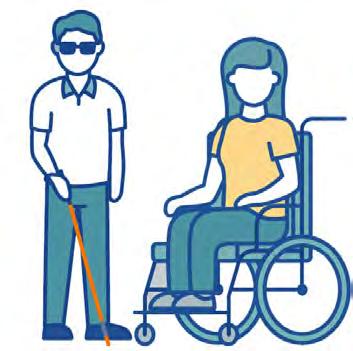
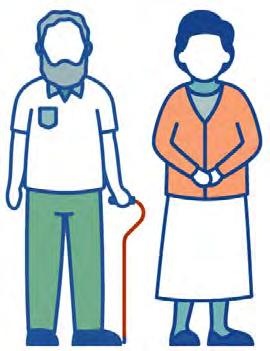
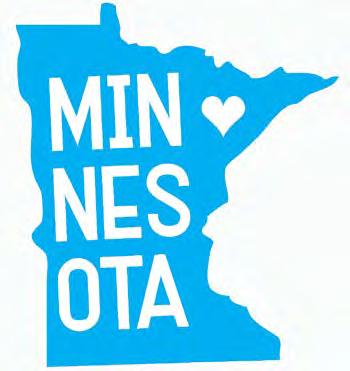

STAY SAFE,MINNESOTA
Take steps to protect yourself & others from the COVID-19 virus
1
Stay up to date on your COVID-19 vaccine, especially if you live with disabilities. The vaccine will protect you against serious illness. Even if you were vaccinated in the past, you may still need the updated vaccine. The latest vaccine provides protection from the newer variants circulating in our communities right now.
COVID-19 vaccines continue to be very good at preventing severe disease, hospitalization and death. Make sure you and your family are up to date on any COVID-19 vaccine doses you are recommended to get.
2
Stay at home when you are sick. Take care of yourself and those around you by staying home (away from others) if you have symptoms like a cough, sore throat, sneezing or fever.
3
Take a COVID-19 test when needed. It is important to get tested if you have symptoms or were in close contact with someone who has COVID-19. If you test positive and are at higher risk, medications are available. The medications are most effective within 5 days of when symptoms begin, which is why you should get tested.
4 5
Frequently wash your hands and cover coughs to keep germs from spreading.
MDH works with communities to provide safe and free onsite COVID-19 vaccines.
Check for vaccine appointments using VACCINES.GOV or contact your primary health care provider or a local pharmacy.
To locate a community vaccination event near you or if you have For questions related to COVID-19, call the MDH COVID-19 public hotline at 1-833-431-2053 Monday, Wednesday, Friday: 9 a.m. to 5 p.m., and Tuesday, Thursday: 9 a.m. to 7 p.m.
The Minnesota Department of Health (MDH) works in partnership with communities to provide safe and free COVID-19 testing in areas with outbreaks, increasing cases or other barriers to access existing test sites. Walk in or schedule an appointment for a test at free community testing sites across Minnesota.

JUNE 2024 Volume 35, Number 6 Pg 10
Access Press received a Community Engagement and Diverse Media Grant from the Minnesota Department of Health to provide information about Covid-19 and vaccinations to our readers and the community of people with disabilities. There will be many informational items we will share with you. LEARN MORE AT https://www.health.state. mn.us/diseases/coronavirus/ prevention.html
Anoka, federal government reach agreement on renters’ mental health
Anoka city officials have agreed not to disclose private medical information about renters with mental health issues and to pay $175,000 to resolve a complaint from the federal government that the city discriminated against mentally ill residents in enforcing an anti-crime law.
The U.S. Department of Justice (DOJ) May 22 announced its agreement with the city of Anoka. It addresses allegations that the city violated the federal Americans with Disabilities Act (ADA) by improperly pressuring landlords to evict tenants with mental health issues over multiple police or emergency calls to their addresses. The DOJ also filed a federal lawsuit May 22 against the city. That case won't go forward if a judge approves the agreement.
The department told the city in a letter in November 2023 that an investigation showed illegal discrimination in enforcing a "crimefree" housing ordinance allowing the city to fine or deny rental licenses to landlords whose properties are deemed a nuisance or a source
Metro Mobility subject of audit
Metro Mobility provides rides for 18,500 Twin Cities residents with disabilities, with almost 2 million rides logged last year. But a recent state audit found problems, including missed goals for timely pickups and drop-offs, and more than 5,000 denied ride requests. Riders have complained about inconsistent service, long waits for buses, rides that don’t show up, untimely drop-offs that imperil jobs and medical appointments, circuitous routes that make little sense, rides that were denied and drivers who they say aren’t trained properly.
Every time a ride is denied, and a pickup or drop-off is delayed, “it has a deeply calamitous, consequential effect on that person’s life,” said Sen. Scott Dibble (DFL-Minneapolis), who recently chaired a hearing on the Office of the Legislative Auditor’s report before the Senate Transportation Committee.
“That’s something we would never tolerate in our own lives — not even one time, and we’re asking other people to tolerate that,” Dibble added.
Metro Mobility users must book their rides one to four days before their trip. If a bus arrives 29 minutes late for a pickup, it’s still considered on time. The maximum amount of time permitted for a ride aboard a Metro Mobility vehicle in the Twin Cities service area is 2½ hours — roughly the time it takes to drive to Duluth. This is largely because buses frequently pick up multiple customers, often in routes that don’t make sense.
A Facebook group called MN Metro Mobility Riders and Supporters helps fill in the gaps for users with information and support. The group’s intention is to make the service better, said Tim Marciniak, a Metro Mobility customer since the 1980s who created the Facebook page.
He’s advocated for a Passenger Bill of Rights, an oversight commission appointed by riders and a social media presence to help passengers experiencing sudden changes in their schedule.
Met Council officials say they are working to improve Metro Mobility service, including by bolstering staff to field complaints, upgrading the fleet of vehicles and improving technology. So far this year, no rides have been denied, and on-time performance is about 93%, according to the council.
“We have a common goal to provide a high level of service for people with disabilities, who deserve nothing less,” Council Chair Charlie Zelle said at the Senate hearing.
(Source: Star Tribune)
Checking of enrollee assets resumes
When Minnesota’s post-pandemic public health care program renewals wrap up this spring, the state will restart a longstanding practice of checking some enrollees’ assets to make sure they are eligible for coverage.
Asset limits ensure that public health care programs pay for care only when no other resources are available.
Many Medical Assistance enrollees do not have asset limits. The state will notify those who do.
For certain Medical Assistance and Medicare Savings Programs enrollees, assets will be reviewed when their annual renewal is due. If enrollees have more assets than the
of criminal activity.
In at least 780 cases from 2018 through mid-2023, the city issued weekly reports to landlords sharing details about people's mental health crises and even how some tried to kill themselves, the DOJ stated.
program limits, they will need to reduce or spend down their assets to keep their health care coverage.
A person’s home, vehicle and personal items do not count as assets during the renewal process. Assets that do count include checking and savings accounts, stocks, bonds, trusts, mutual funds, real property and other financial investments.
“Our public health care programs serve Minnesotans who most need our support to access health care,” said Human Services Commissioner Jodi Harpstead. “We want to get the word out about asset limits now to give enrollees time to act to keep their health insurance.”
Annual eligibility checks – often called renewals – were paused by the federal government during the COVID-19 pandemic. States resumed renewals in 2023 in an effort called the unwinding period.
Asset limits for public health care programs were temporarily disregarded by the Legislature to help eligible Minnesotans maintain health insurance during the unwinding period. The asset limits resume after the unwinding period.
Asset limits differ depending on program and family size. Medical Assistance and Medicare Savings Programs enrollees who have an asset limit will receive a notice in the mail about two months before their renewal month reminding them that assets will be counted for their upcoming renewal.
Enrollees can look up their renewal month at www.mnrenewallookup.com.
The notice will explain that if enrollees have assets above program limits, they will need to reduce or spend those assets by their renewal deadline to keep their health care coverage. The notice will also remind enrollees to save documents that show proof of their assets, such as bank statements, to send in with their renewal form.
For a breakdown of asset limits, visit the Income and Asset Guidelines (DHS-3461A) (PDF) at https://edocs.dhs.state.mn.us/lfserver/ Public/DHS-3461A-ENG.
(Source: Minnesota DHS)
Deaf Minnesotans need interpreters
American Sign Language interpreters are an essential part of life for thousands of Minnesotans. They are there when someone is diagnosed with cancer or if they end up in court. They attend weddings, family reunions and funerals. But the pool of interpreters is shrinking in Minnesota and across the nation. A survey of Minnesota interpreters in 2021 found nearly 4 percent expected to leave the profession within five years. Leaders of two interpreting agencies in Minnesota said they are seeing service requests rising and more of those asks are going unmet.
At the same time, the three Minnesota colleges with interpreter training programs have seen participation drop.
“We're afraid for our quality of life. We're afraid we're losing our access to communication. We're afraid to be pushed aside,” said Darlene Zangara, executive director of Minnesota Commission of the Deaf, DeafBlind & Hard of Hearing. The commission launched an Interpreting Forward 203 effort and has gathered ideas from around the state on how to shore up
DOJ officials described the November letter as a first-of-its-kind finding of discrimination against people with mental health disabilities from one of the hundreds of anti-crime ordinances enacted by cities across the U.S. since the early 1990s. Housing and civil liberties advocates have long argued that those policies are enforced more harshly in poor neighborhoods and against people of color.
“Anoka's so-called ‘crime-free’ housing program does not protect public safety but rather risks lives by discouraging people with disabilities and their loved ones from calling for help when needed most,” Assistant U.S. Attorney General Kristen Clarke of the DOJ's Civil Rights Division said in a statement.
The agreement said the city denied wrongdoing and the allegations in the November letter and the lawsuit filed Tuesday.
“However, the city desires to avoid any litigation,” the agreement stated, adding that Anoka wanted to ensure that its policies comply with both the ADA and federal fair
the interpreter workforce and ensure people get high-quality services. The input doesn't point to one simple solution. Zangara said the commission will create a website this summer highlighting a long list of issues, and those will be narrowed into a plan.
One of the first problems, many people said, is too few people consider an ASL interpreting career.
Many colleges and universities offer American Sign Language classes, but St. Catherine University is one of the few with an interpreting program. ASL is a language and a culture, but interpreting programs teach ethics and how to listen and talk at the same time.
Their interpreter class size dropped from 16 people before COVID-19 to seven. At North Central University, assistant professor Sydney Groven said their graduating class in ASL interpreting has fallen from nine people to one this year.
Broad demographic and workforce factors are contributing to the looming shortage, including the decline in college enrollment and baby boomer retirements. And fewer colleges are requiring world language classes, Groven said, so not as many people are exposed to ASL.
There are also industry-specific issues, like getting people to stick in a profession that involves a number of expensive hurdles post-college. For example, work in courts and educational settings takes more training and certification.
The certification process should be less expensive and easier to pass, said Kathleen Smith, president of Minnesota Association of Deaf Citizens. She said that in the past people could request an interpreter a day or two ahead of an appointment, but with the growing shortage they now need to reach out at least a week in advance.
(Source: Star Tribune)
Widower sues over accommodations
The widower of a 29-year-old woman who died by suicide, after a lengthy battle with her employer over her service dog and other work accommodations, is suing the Ulta Beauty salon company in federal court.
Lanie Zimney worked as a hair stylist at the Ulta salon in St. Cloud for about five months
housing laws.
The city's $175,000 payment will cover compensation for people the DOJ identifies as having been harmed by Anoka's enforcement of its anti-crime ordinance.
The city will have 30 days to revise its anticrime housing ordinance, which allows the Anoka to suspend a landlord's rental license if there are more than four “nuisance” calls to an address in a year. A nuisance call involves “disorderly conduct” such as criminal activity and acts jeopardizing others, but also “unfounded calls to police” and allowing a “physically offensive condition,” without defining those further.
Under the agreement, the city cannot treat mental health-related calls to an address as nuisance calls, and it is required to notify both a renter and landlord whenever a call for another reason is deemed a nuisance call, giving them information about how to appeal. (Source: WCCO-TV)
in early 2019. When she disclosed she was pregnant, she was abruptly escorted from the store and told she couldn’t work until she provided paperwork on the accommodations she required because of her disability, according to a lawsuit filed in U.S. District Court.
The lawsuit claims Ulta violated Zimney’s rights and asks to award Zimney’s husband, Allan, damages. Ulta had until the end of May to file a response.
According to the complaint, Ulta hired Zimney as a stylist. During the application process, Zimney disclosed the existence of multiple, chronic physical and mental health conditions.
During the interview process, Lanie Zimney told management that she could provide medical documentation for her accommodations, but no one required it. She worked for more than four months on a full-time weekday schedule with occasional weekend shifts.
Her accommodations included access to a water bottle and chair at her workstation, as well as her service dog, Bingo. Bingo was trained to remind Zimney to take her medications, retrieve medicine or water and respond to seizures.
In May 2019, when Zimney told management she was pregnant, Ulta withdrew its accommodations, barred her from the workplace, and demanded extensive paperwork. The U.S. Equal Employment Opportunity Commission (EEOC) states an employer can’t ask for documentation on a request for reasonable accommodation when the need is obvious or the individual has already provided the employer with sufficient information.
Zimney lost work hours and her medical insurance, and was scheduled at times that conflicted with child care needs.
Lanie Zimney was “effectively, constructively discharged,” attorney Benjamin Kwan said. “What it comes down to is the employer did enough that any reasonable person would know they’ve already been fired.”
Allan Zimney said his wife felt dehumanized and suffered from depression. She died by suicide in October 2020, at their home in Ogilvie.
REGIONAL NEWS To page 13

JUNE 2024 Volume 35, Number 6 Pg 11
Groundbreaking Partners in Policymaking program seeks applicants
Many Minnesotans with disabilities and their family members have taken advantage of the groundbreaking Partners in Policymaking program. The deadline to apply for the 20242025 class is July 12. This will be the 42nd class.
The program was created by the Minnesota Governor’s Council on Developmental Disabilities 37 years ago. It has been offered nationally and internationally.
Through informative and interactive sessions, Partners classes provide leadership skills and the process of developing positive partnerships with elected officials and other policymakers who make decisions about the services that program participants and/or their families use.
Partners is considered to be accessible, informative and empowering. Since 1987, almost 1,200 self-advocates and parents have graduated in Minnesota.
Applicants must meet set requirements. Requirements include a commitment to attend all eight sessions; an interest in learning and practicing new skills in a comfortable and safe environment, and a desire to build and strengthen a network of people from diverse
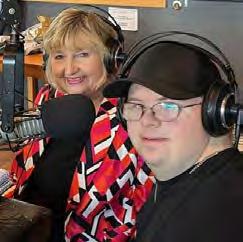
Partners participants took part in a radio show.
cultural backgrounds and life experiences. Applicants must also have a willingness to learn from national and state experts who share the same vision and values
The program is designed for parents and legal guardians of young children with developmental disabilities and adults with
disabilities. Sessions start September 20-21 and continue through May. No class is held in December.
Learn about a wide array of topics including history of disability and services; history of various disability rights movements; personcentered thinking and planning; inclusive education; governmental roles; civil discourse and much more. Class members must attend all weekend sessions.
Classes are held at the Crowne Plaza Aire, 3 Appletree Square, Bloomington. The program is free to participants, with costs are covered in part by a federal appropriation from the Administration for Community Living to MNCDD
Overnight accommodations are provided for people who lives in Greater Minnesota are free. Class members are matched and housed in double occupancy rooms. Mileage reimbursement is also available for class members. Also covered are meals, speaker handouts, resource materials, publications and interpreter or language translation services. Reimbursement up to a maximum dollar amount per weekend session is available for
participants needing respite, child care or personal care attendant services when another funding source doesn’t cover such costs. The program does not provide onsite child care services. Family members are not permitted to stay at the hotel during the weekend training sessions unless a family member is serving as a personal assistant to a class member. After each session, a homework assignment that builds on and supports the topics addressed must be completed by each class member and turned in at the following session.
Speakers are national and state subject matter experts or practitioners.
How are participants chosen? A review committee, which includes Partners graduates and representatives from MNCDD, selects participants based on several criteria. Class size is limited to 35 participants. Decisions will be made by August 9.
Apply online and learn more at www. PartnersInPolicymaking.com
Or contact Brenton Rice, Odyssey Group, at Brenton@TOGevents.com or 651-242-6589
Partners graduates reflect on experiences and knowledge gained
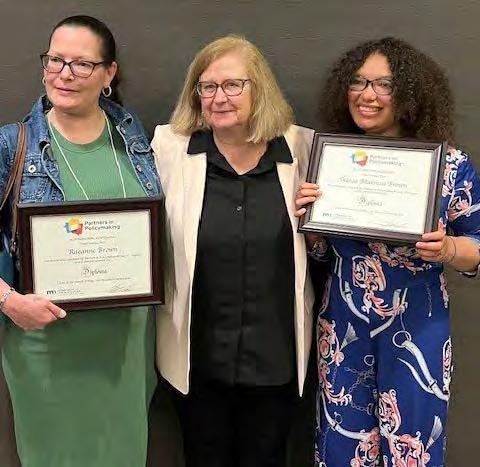
In May the Minnesota Governor’s Council on Developmental Disabilities (MNCDD) celebrated the graduation for Class 41 of its advocacy training course, Partners in Policymaking. The program teaches leadership and advocacy skills and the process of developing positive partnerships with elected officials and other policymakers who make decisions about disability supports and services. Thirty people were in the 2023-2024 graduating class. This year’s graduating class is a diverse mix from across the state, including parents of children with disabilities and adults with disabilities.
“This groundbreaking program continues to impact lives in so many positive ways,” said Colleen Wieck, executive director of the Governor’s Council on Developmental Disabilities. “Commencement isn’t the end of the educational journey, but rather the beginning of a lifetime of advocacy.”
Graduates reflected on their experiences. Steven Reinardy of Inver Grove Heights is the current director of safety for Minnesota Diversified Industries (MDI). As a child Reinardy developed macular dystrophy, which brings a loss of one’s central vision.
As he grew older, he witnessed first-hand the changes in the ways people with disabilities were treated in society. While there has been progress, Reinardy believes more can be done. By participating in the program, his hope is to become a stronger advocate for himself and others. Reinardy is interested in making a positive change in transportation opportunities for individuals with disabilities.
“By participating in Partners, I have been armed with the knowledge to be able to make a difference,” he said. “With the knowledge and confidence, I have gained, I am ready to speak to lawmakers about increasing the quality of transportation for those with disabilities.”
Dennis Hruby of Hutchinson, a retired parent of two children and one grandchild with serious developmental disabilities, felt called to enroll in the course because he feels that support has not greatly changed in decades. Because of his involvement in the course, Hruby and his wife Sandy were able to start a nonprofit to provide parents with resources for children with disabilities.
“We have channeled our frustrations and are working to make a positive difference,” said Hruby. “Being a part of this training has
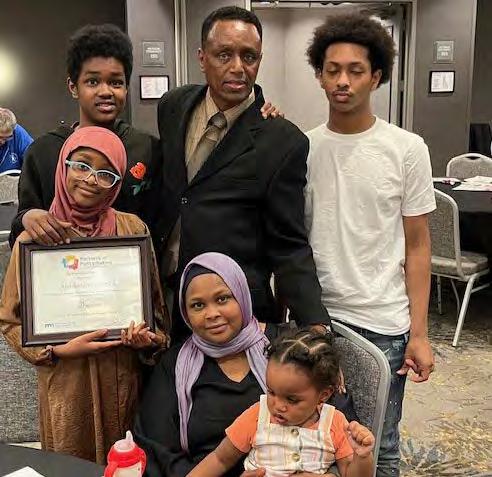
helped immensely. We are grateful for the learning and understanding offered in this outstanding course.”
Daonna Depoister and her son Alexander, 20, also took part in Partners. She believes this course will help her better support her son as he becomes a self-advocate. Depoister is hoping her time in the program leads to her and her son better understanding the complex world of disability advocacy.
Andrew Start, also of Plymouth, is another new graduate. Start, who has Down Syndrome, enrolled in the program to learn about competitive inclusive employment, marriage penalties for disabled persons, and treatment of individuals with Down Syndrome in other countries.


Start is excited to take the knowledge from the program and become an advocate for those with disabilities. He hopes to become a public speaker and to eventually produce YouTube videos that shed light on the needs of people with Down Syndrome and other disabilities.


JUNE 2024 Volume 35, Number 6 Pg 12 For your FREE estimate, call 800-649-5215 651-399-3075 Learn more at amramp.com Changing our customers’s lives, one ramp at a time. • Low cost • FREE home evaluations • Rent or buy • Installed in days “It is important that our clients who struggle with stairs are able to maintain their freedom, dependence and community ties.” Kent Fordyce KENT’S ACCOUNTING SERVICE, LLC 612-889-2959 fordyce6@aol.com Fax: 952-472-1458 6371 Bartlett Blvd Mound, MN 55364 Certified ProAdvisor 2022 | 2005-2021
DEADLINE JULY 12
MNCDD leader Colleen Wieck, center, gave kudos to graduates.
Families were pleased to take part in the ceremony.
PHOTO SUBMITTED PHOTOS
SUBMITTED
in singing, too.”
After graduation, he joined the Metropolitan Men’s Choir in 2007 and has been singing with the group ever since.
“In 2012, my mom looked up the Interact Center online. It is a professional theater company that employs performing artists who are on the disability spectrum,” Wolfe said. “At first I didn’t want to join, because almost everyone there looked more disabled than I did. But I decided to swallow my pride and try it, and I am very glad that I did. Interact has become a very important part of my life, and I am happy to have it.”
It was during a workshop that Graczyk was doing at Interact in 2018 that she met Wolfe. Graczyk is a choreographer, performer and scientist who has created her own production company. She has collaborated on more than 60 productions nationally and internationally. She and Michael started working together.
“This led us to creating a production called the Hear Them Now project,” Wolfe said. “It explored the members of the disability and LGBT+ community.” Wolfe said Aaron Gabriel, a generative theater artist and theater/dance composer, connected the two again for the Thresholds project.
“Beth gave me an assignment,” Wolfe said. “She asked me to come up with movements that I do while I am waiting for a bus. She asked me to then exaggerate those movements and make them bigger.”
“Part of the project is to invite people to share experiences, whether they are on the spectrum or not,” Graczyk said. “It’s the idea of what Michael does on a daily basis and amplify what he is already experiencing. We developed a lot of material in studios and other spaces in Minneapolis. And we took it outside. Where Michael narrates his movements is really special. He describes what he is thinking and feeling.”
Wolfe said the minimal movements that he makes while waiting for the bus become
REGIONAL NEWS
From page 11
“This case really underscores how much we, as a society, ask of working parents. And, in turn, Lanie Zimney asked so little of her employer,” Kwan said. “This case really shows when employers take simple accommodations away, we immediately see how quickly things can fall apart for disabled workers.”
In April 2023, the director of the local EEOC office found reasonable cause that Ulta discriminated and retaliated against Zimney, in part based on disability.
(Source: Star Tribune)
Inpatient services’ end eyed
A public hearing was held in May on a request from Lakewood Health System ending inpatient mental health services.
The Minnesota Department of Health (MDH) held the public hearing on Lakewood Health System closing the 10-bed psychiatric inpatient unit of its critical access hospital in Staples.
According to the submission filed by Lakewood Health System, the hospital will continue to provide outpatient mental health services to the community following closure of the inpatient unit.
The hearing was hosted by MDH’s Health Regulation Division to provide a forum for the community to discuss the change in services and available alternatives for Lakewood Health System patients.
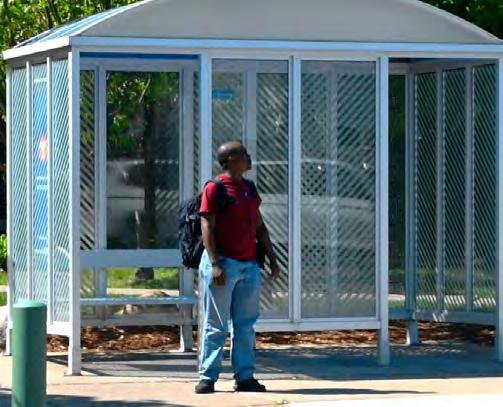
bigger and bolder and become a kind of dance, and this is shown in one of the short films. ‘Thresholds is supposed to explain to multiple audiences how the autistic brain comprehends and takes in sight, sound, smell and touch as opposed to the nonautistic brain,” he said. Wolfe said it is easier for him to communicate his feelings through a performance than through ordinary conversation. “I have a little bit of difficulty expressing my needs to people who can do something about those needs,” he said. Graczyk said she has been collaborating on this project since 2020 with Wolfe, Gabriel, Astorga and Hanne Vaughn as video editor. “Hanne was a crucial part of our film
Community members were invited to join the hearing online. The hearing was the latest proceedings by health care providers seeking to limit or cut mental health services around the state.
In June 2021, the Minnesota Legislature passed legislation requiring a public notice and a public hearing before closure of a hospital or hospital campus, relocation of services or cessation in offering certain services.
(Source: Minnesota Department of Health Worker training offered
There is an increasing need for health care workers in the United States, especially since many left the medical profession after the challenges of COVID-19. That has especially affected people with disabilities.
The International Institute of Minnesota
In St. Paul is working to fill that need by providing certified nursing assistant (CNA) classes specifically for new Americans.
The classes, according to program manager Julie Garner-Pringle, have been going since 1990. Garner-Pringle has worked with the program for the past 15 years. With a background in teaching, she taught English in Hungary and Egypt before coming to the institute to teach English to adults. Other support staff for the CNA program include English language teachers, and a nurse is responsible for teaching the program content.
Garner-Pringle said two tracks of the CNA training are taught: an intensive seven-week course and supportive eleven-week course. “We let the students know that the training

making. And Michael grew so much in his ability to express his needs, as well as put in this performance.
“Communication starts with how we are experiencing the world; we do not give ourselves the time to share (those experiences.) We don’t understand how we perceive things differently or similarly,” Graczyk said.
Wolfe explained that he sees autism as a gift, although it has hindered him in a lot of ways. “A lot of things people without autism can do, I will never be able to do,” he said. “But at the same time, it has enlightened me. I do plenty of singing in Interact. I would like to record my own album some day and tour all over the world and sing songs from
will be like a full-time job,” she said. “The seven-week course is Monday-Thursday and the 11-week is Monday -Friday.”
that album. It all comes down to the same thing. There are not a lot of people in the music industry who want to work with somebody who has autism.”
According to Graczyk, much has been done over the past 20 years regarding the area of autism. “It’s not so much a lack of awareness,” she said. “There are a whole bunch of people on the spectrum who do not want to be medicalized. It’s similar to being a queer person and finding the world is not accommodating. It’s not being given a chance because of stigma or a sense of difference. The more we can talk about it, the more we can understand rather than putting people in categories. The more dialogue we have, the more we can erode the differences.”
Wolfe recalled the bullying he faced when he was in elementary school and middle school. “A lot of people in the world tease and taunt and make fun of things just because they don’t understand those things they are making fun of,” he said. “I have a bit of resentment about that.”
Graczyk said she believes her interests of artistry and science are very similar. She said, “In both, you observe and then develop an experience.”
Wolfe said he is grateful to be a part of the Threshold project. “This is the very thing we need in order to help audiences understand what having autism is like, and to understand what having a disability is like.”
Graczyk said she is looking forward to presenting the live performance and films at the Parkway. “We’ve been working on this for two to three years, and it feels like a beginning, an opportunity to grow with the community. Hopefully, each audience member will feel like they are on their own journey and find out about themselves.”
This article originally appeared in TMC Publications.
A version of this story appeared in the TMC Publications, which are published in Minneapolis and St. Paul.
According to Garner-Pringle, the state requires a minimum of 75 hours completed for
REGIONAL NEWS To page 15




JUNE 2024 Volume 35, Number 6 Pg 13 Unified Work, powered by MDI, is the driving force behind our vision of meaningful employment for ALL. Our holistic approach bridges career training for individuals with disabilities and specialized consulting services for businesses. Our vision is to provide meaningful employment for all people with disabilities. Looking to get your business started with our FREE training? Contact Ryan Anderson, Workforce Development Manager, at 651-999-8206. Learn more at UnifiedWork.com
PERFORMANCE From page 1
Many former refugees are helping to make Minnesota a better place for all. Learn how at mn.gov/dhs/outstanding-refugees
Michael Wolfe waited for the bus.

RADIO TALKING BOOK
Look for website updates
The State Services for the Blind website has some updates. The Radio Talking Book Radio News is posted online each month, with links to the audio promotions for each book. Find the updated pages here: mn.gov/ deed/ssb/radio Staff welcomes any feedback or suggestions, and comments about current books listeners would like to hear. Contact Joseph Papke at 651-539-2316 or joseph. papke@state.mn.us
For June, 20 new books will premiere. Radio Talking Book is not just for listeners with visual disabilities. Anyone with difficulty reading or turning pages can enjoy the service. Hear programming on a hand-held mobile device, for either iOS or Android. Visit the Apple App Store for iOS, or Google Play for Android, and download the Minnesota Radio Talking Book app.
The sampling published monthly in Access Press doesn’t represent the full array of programming. Listen to RTB’s live or archived programs online at www.mnssb. org/rtb, and learn more about programs. Missed a book broadcast? Access it for one week following its original broadcast in the online weekly program archive.
For help accessing the archive, contact Ronnie Washington at 651-539-1424 or SSB. Equipment@state.mn.us.
If the book’s broadcast is no longer available in the archive, contact staff librarian Molly McGilp at 651.539.1422 or Molly. McGilp@state.mn.us
Books broadcast on the Minnesota Radio Talking Book Network are available for loan through the Minnesota Braille and Talking Book Library in Faribault. The catalog is at www.mnbtbl.org. Click on the link Search the Library Catalog. Call the Minnesota Braille and Talking Book Library at 800-722-0550, Mon-Fri, 9 am - 4 pm CST.
For updates, go to the Facebook site Minnesota Radio Talking Book.
Audio information about the daily book listings is on the National Federation for the Blind (NFB) Newsline. Register for NFB Newsline by calling 651-539-1424. The NFBNEWSLINE service provides access to more than 500 magazines and newspapers. To learn more, visit www.nfb.org/programsservices/nfb-newsline; 612-5627803
Chautauqua*
Monday – Friday 6 a.m.
Womb, nonfiction by Leah Hazard, 2023. A groundbreaking, triumphant investigation of the uterus—from birth to death, in sickness and in health, throughout history and into our possible future. Read by Carol McPherson. 14 broadcasts; begins Mon, June 17.
Past is Prologue*
Monday – Friday 11 a.m.
Armada, nonfiction by Colin Martin & Geoffrey Parker, 2023. The definitive history of the Spanish Armada’s attempted 1588 conquest of England. Read by Charles Gould. 25 broadcasts; begins Wed, June 12.
Bookworm*
Monday – Friday 12 p.m.
The Romantic, fiction by William Boyd, 2023. A beguiling romp of a novel, at once intimate and panoramic, about the adventures and misadventures of a nineteenth-century everyman. Read by Stuart Holland. 20 broadcasts; begins Mon, June 3
The Writer’s Voice*Monday – Friday 1 p.m.
At the Lake, nonfiction by Jim Landwehr, 2023. A memoir filled with humor, warmth, and reverence for life up North. Read by Jill Wolf. Seven broadcasts; begins Tue, June 11. The Country of the Blind, nonfiction by Andrew Leland, 2023. A witty, winning, and revelatory personal narrative of the author’s transition from sightedness to blindness and his quest to learn about blindness as a rich culture all its own. Read by Holly Sylvester. 12 broadcasts; begins Thu, June 20. – L
Choice Reading*
Monday – Friday 2 p.m.
The Caretaker, fiction by Ron Rash, 2023. A breathtaking love story told against the backdrop of the Korean War as a small Appalachian town sends its sons to battle. Read by Brenda Powell. Eight broadcasts; begins Thu, June 13.
Day, fiction by Michael Cunningham, 2023.
An exquisite exploration of the struggles and limitations of a Brooklyn family over three years—and how people all must learn to live together and apart. Read by Holly Sylvester. Eight broadcasts; begins Tue, June 25. – L, S
Afternoon Report*
Monday – Friday 4 p.m.
Homegrown (rebroadcast), nonfiction by Jeffrey Toobin, 2023. The definitive account of the 1995 Oklahoma City bombing and the enduring legacy of Timothy McVeigh, leading to the January 6 insurrection. Read by John Potts. 14 broadcasts; begins Mon, June 3.
The Conspiracy to End America, nonfiction by Stuart Stevens, 2023. A former chief Republican strategist offers an ominous warning that the GOP is dragging the country toward autocracy—and if people don’t wake up to the crisis in the system, 2024 may well be the last free and fair election. Read by Don Lee. Six broadcasts; begins Mon, June 24. – L
Night Journey*
Monday – Friday 7 p.m.
Skeletons in the Closet, fiction by Jean-Patrick Manchette, 2023. A brisk and brutal French detective thriller full of unexpected comedy and feeling from 1976, now translated into English. Read by John Schmidt. Five broadcasts; begins Mon, June 10. – L, V
The Eden Test, fiction by Adam Sternbergh, 2023. An electrifying domestic suspense novel about a couple who are forced to the ultimate extremes to save their marriage― and themselves. Read by Cintra Godfrey. 11 broadcasts; begins Mon, June 17. – L, V
Off the Shelf*
Monday – Friday 8 p.m.
Birnam Wood, fiction by Eleanor Catton, 2023. A gripping psychological thriller of high drama and kaleidoscopic insight into what drives us to survive. Read by Jack Rossmann. 16 broadcasts; begins Mon, June 3. – L
The East Indian, fiction by Brinda Charry, 2023. An exhilarating debut novel about the first native of the Indian subcontinent to arrive in Colonial America, inspired by a historical figure. Read by Michele Potts. 11 broadcasts; begins Tue, June 25. – L, S Potpourri*
Monday – Friday 9 p.m.
Acting Naturally, nonfiction by David Thomson, 2023. A fascinating look at some of the cinema’s finest actors and how they approach their craft. Read by Andrea Bell. 10 broadcasts; begins Wed, June 5. – L Shelter, nonfiction by Lawrence Jackson, 2022. A stirring consideration of
Thanks to ALL OF YOU for supporting Access Press
& up)
Janice Chevrette
Jane Larson
Ronna Linroth
Brandon Miller
Lynda Milne
Ann and Larry Roscoe
Walter Siebert
Joel Ulland
Kay Willshire
Tamarack Habilitation Tech, Inc.
Jeff Bangsberg & Anita Boucher
Anne L. Henry
Kim Kang
Steve Kuntz
Alexandra Bartolic
Dena Belisle
Tim S. Benjamin
Gretchen Bratvold
John & Marilyn Clark
Tom Clark
Mark Daly
Yoshiko S. Dart
Anonymous
Rosebud Elijah
Joel Enders
Lee
& Dale Erickson
Laura Fedock
Kent Fordyce Vicki Garrets
BRONZE
All times listed are Central Standard Time.
Abbreviations V – violent content R –racial epithets L – strong language S –sexual situation G – gory descriptions
homeownership, fatherhood, race, faith and the history of Baltimore. Read by Nathan Hunter. 12 broadcasts; begins Wed, June 19.
Good Night Owl*
Monday – Friday 10 p.m.
The Hollow Kind (rebroadcast), fiction by Andy Davidson, 2022. An epic horror novel about the spectacular decline of the Redfern family, haunted by an ancient evil. Read by John Holden. 16 broadcasts; begins Mon, June 3. – L
The Devil’s Playground, fiction by Craig Russell, 2023. A riveting 1920s Hollywood thriller about the making of the most terrifying silent film ever made, and a deadly search for the single copy rumored still to exist. Read by Holland Richner. 16 broadcasts; begins Tue, June 25. – L, S RTB After Hours*
Monday – Friday 11 p.m.
The Romance Recipe (rebroadcast), fiction by Ruby Barrett, 2022. An irreverent LGBTQ+ rom-com about a restaurant owner and a reality-tv star. Read by Holly Sylvester. 10 broadcasts; begins Mon, June 3. – L, S Do Your Worst, fiction by Rosie Danan, 2023. Sparks fly when an occult expert and a disgraced archeologist become enemies-withbenefits in this steamy romance. Read by Pat Muir. 11 broadcasts; begins Mon, June 17. – L, S
Weekend Program Books
Your Personal World, 1 p.m. Sat, presents Life is Hard by Kieran Setiya, read by Parichay Rudina. For the Younger Set, 11 a.m. Sun, presents First-Year Orientation, edited by Lauren Gibaldi and Eric Smith, read by MaryBeth Redmond. – L. Poetic Reflections, noon Sun, presents Modern Poetry by Diane Seuss, read by Mary Knatterud – L, S; followed by Raised by Wolves: Fifty Poets on Fifty Poems, a Graywolf Anthology, read by Jim Ahrens. The Great North, 4 p.m. Sun, presents Confluence: A History of Fort Snelling by Hampton Smith, read by Yelva Lynfield followed by The Lincoln Dell Cookbook by Wendi Zelkin Rosenstein and Kit Naylor, read by Jill Wolf.
SUPPORT ACCESS PRESS*
Brandon Miller
Jim Musselman
Debra J. Shriver
Robyn Wade
Courage Kenny
Robert Gregory
Craig Dunn & Candy Hart
Pam Hochrein
Judy Hunt
Rick & Susie MacPherson
Brian Musselman
Manley Olson
Mark W. Traynor &
Julee Quarve-Peterson
Hilary and Stuart Ratner
Ken Rodgers
Linda Wolford
Amanda & Mark Tempel
Hammer Residences, Inc.
Mail your donation


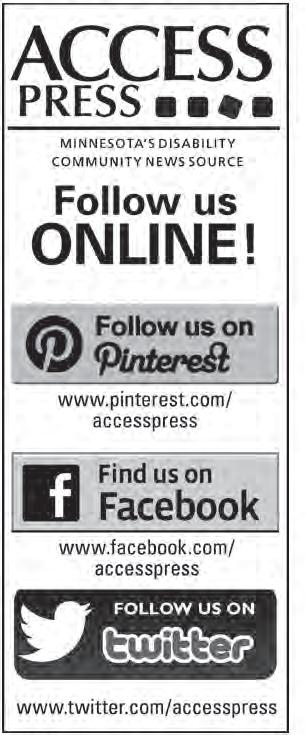
JUNE 2024 Volume 35, Number 6 Pg 14
GOLD ($500-$999)
BENEFACTOR ($1000
to: Access Press, LTD. PO Box 40006, Industrial Station, St. Paul,
DATE: AMT.
$ NAME ADDRESS CITY/STATE/ZIP PHONE EMAIL
MN 55104-8006
ENCLOSED
Friend $50+ Bronze $75+ Silver $150+ Gold $500+ Benefactor $1000 SILVER
($150-$499)
Ann
Jen Peterson
Berg Jesse Bethke-Gomez Jean Christy Richard Cloud Margot Cross Daniel Ness Dawn R. Doering Dean Doering Anonymous Ellen J. Emanuel Steve & JoAnn Erbes Dale Erickson Claudia Fuglie Lael Gatewood Marjorie Goldberg Mike Gude Terry Hagenah Hammer Residences Ellen & Skip Houghton Maren Hulden Catherine Hunter Dale Janiszeski Barb Kane Kim Keprios Megan Keyser Sue Kohler Steve Larson Michelle & John LeBlanc Gene Martinez John Marty Tom & Kay Milne Eric S. Nelson Daniel Ness Annette M. Pantel Mark Payette Reach for Resources Laurie Sack Carrie Salberg Anita & Luther Schermer/Granquist Stephanie Schwartz Jon Skaalen Laurene Tomaszewski Lisa Vala Cathy Wick Zekerya Yargici Leslie Zaricor Richard Ziton FRIEND ($50-$74) Nora Aileen Beall Joanna & Richard Cortright Paul Bauer & Pat Cretilli Nancy N. Eustis Thomas Fogarty Give Lively Foundation Burl Gilyard Ann Griffith Phil Jacobsma Laura Johnson Mark Knutson Tag Krogseng Sandy Lane Kenneth Latkin Shelley Madore Andrea McKee Twyla M. Misselhorn Debra Norgaard William & Joan Overby Annette M. Pantel Sonja Peterson Donn Poll Alina Schroeder Mike Schwartzbauer Gwendolyn Short Diane Sprague Katherine Tomlinson Dick VanWagner Katheryn J. Ware
($75-$149) Sarah

Open Flow Forum
ENJOY !
The Artists with Disabilities Alliance meets via Zoom 7-9 p.m. June 6 and July 11. Virtually join artists with disabilities and supporters to share visual art, writing, music, theater and artistic efforts or disability issues. Facilitators are Tara Innmon and Andy Sturdevant from Springboard for the Arts. Anyone needing accommodations including ASL interpreting or captioning contact Andy. Funding available for access needs. FFI: 651-2940907, resources@springboardforthearts.org, openflowmn@gmail.com
Making arts accessible
Several workshops in June will offer different ways of making the arts more accessible to people with disabilities. The workshops are offered by the Minnesota Association of Community Theatres with funding from the Metro Regional Arts Council. Workshops will be held on Saturdays. Preregister. Learn about workshops, registration fees at https://mnact.net/ FFI: Jon, 612-819-0949.
Resources to Enjoy!
The Enjoy! listings are for arts events, banquets, fundraisers, walks and other fun events by and for disability services organizations. Schedules may be subject

Volunteer
to change, so check with a venue or organization before making plans. Arrange for disability accommodations well in advance at any event.
Disability service organizations typically send e-news blasts and have social media. Both are ways to find out about events.
The Minnesota Access Alliance (MNAA) provides an Accessible Arts & Culture Calendar for arts patrons who use accessibility accommodations such as audio description, captioning, ASL interpreting and sensory-friendly accommodations. More details at https://calendar.mnaccess.org. Be sure to check the listing or venue to find out any COVID-19 protocols and if an advance reservation is needed for an accessibility service. Submit accessible events to the MNAA Calendar and MinnesotaPlaylist.com.
To receive a free monthly events calendar, email mactfactor@icloud.com and/or info@ mnaccess.org. Ask for the entire events list or specific lists for ASL interpreting, captioning, audio description, sensoryfriendly accommodations or disabilityrelated topics.
For other accessibility resources or upcoming webinars presented by MNAA, sign up for emails at https://mnaccess.org
OPPORTUNITIES
Speak for nursing home residents
Long-term care volunteers bring passion and value to their work in nursing care facilities across Minnesota. With training and direction from the Office of the State Ombudsman for Long-Term Care, volunteers champion the office’s mission to empower, educate and advocate for the rights of Minnesotans receiving long-term care services and supports.
Certified volunteers assist paid regional ombudsmen to investigate and advocate for residents in nursing homes and assisted living settings. Residents are often unable, uncomfortable or, in some cases, fearful to advocate for themselves. With a resident’s consent, volunteers assist regional ombudsmen responding to residents’ concerns through complaint investigations.
The state is looking for volunteers who are passionate about serving people in long-term care.
There are more than 2,500 nursing homes and assisted living facilities across Minnesota. Fewer than 50 of those facilities currently have a certified ombudsman volunteer. The difference a volunteer
REGIONAL NEWS
From page 13
CNA certification. The institute offers hours well beyond the minimum in various classes. She said there is a pretty thorough screening process for students. They must verify they are from another country but have permission to work in the United States. They need to have an intermediate level of English. They need to be fully vaccinated and complete a phone interview.
“We want the students to have a real desire for healthcare work,” she added.
Garner-Pringle said some of the students come from countries where other languages are the primary languages. Some come from countries where English is mainly spoken. “Some also have advanced degrees but have to start all over when they leave their country,” she noted.
“Being a CNA is a good place to start if someone wants to advance in a health career,” Garner-Pringle said. She said the institute is very supportive of students going out and finding a job upon completion of their training, but also supports those who want to continue their health-care education.
The CNA students are able to do their classroom training, as well as clinicals at the institute, and they can also take their
makes in the lives of long-term care residents is immeasurable.
The greatest volunteer needs are in Alexandria, Breckenridge, Chatfield, Dawson, Detroit Lakes, Duluth area, Eveleth, Fergus Falls, Faribault, Grand Rapids, Hastings, International Falls, Luverne, Madison, Moorhead, Northfield, Owatonna, Red Wing, Silver Bay, Spring Valley, Two Harbors, Virginia, Wabasso, Waseca, Wheaton, Willmar, Winona and Worthington
Anyone interested in becoming a volunteer can visit https://mn.gov/ooltc/ volunteerwithus for more information.
To contact the Office of Ombudsman for Long-Term Care with any residents’ rights concerns, visit https://mn.gov/ ooltc/contactus/. The office provides free, confidential advocacy services.
Children and families
PACER workshops sampling PACER Center offers many useful free or low-cost workshops and other resources for families of children with any disabilities. Some in-person workshops are offered at PACER Center, at Greater Minnesota locations and also offered online. Other
state tests at the same location. “This is very helpful,” she said.
(Source: Midway-Como-Frogtown Monitor) Decision pending on lawsuit
A federal court judge indicated that he needs more time to determine whether a Rochester City Council member's discrimination lawsuit against the city can move forward.
While attorneys for the city argue that several of council member Molly Dennis' claims lack merit due to her status as an elected official rather than an employee, U.S. Federal Court Magistrate Judge Douglas Micko questioned whether that argument covered Americans With Disability Act (ADA) claims.
Dennis was censured in March 2023. City officials have tried to have her lawsuit dismissed. She has sued the city, Mayor Kim Norton and council member Patrick Keane.
Dennis claims that actions taken against her violated several state and federal protections against discrimination based on her attention deficit hyperactivity disorder (ADHD) diagnosis.
Micko said Dennis' claims under Title VII of the Civil Rights Act appear to be contrary to employee definitions in the law, but the ADA doesn't provide clear-cut guidance.
The city’s legal counsel argued that the language could be considered vague, past

POST YOUR EVENTS ONLINE
Access Press is moving more event listings online. There is a word limit and we require that those posting information include event costs as well as accommodations. Are ASL and AD offered? Is there companion seating? A quiet room? Fidgets? COVID-19 protocols?
Accommodations are much more than a ramp for many of us. That kind of information can help someone decide whether or not to attend an event.
To post an event, go to www.accesspress.org, click the resources tab at top right, and go to the post an event line. This is for Minnesota-focused, disability community events. it is not for business advertising for events that aren’t sponsored by a disability group or organization or that do not have a disability focused.
Consider that a small web or print ad can also generate interest in an upcoming event.
For questions about ads, email ads@accesspress.org
Access Press reserves the right to reject events if they do not meet our guidelines. Call the editor at 651-644-2133 ext. 1 or email jane@accesspress.org with events questions.
workshops are online and livestreamed at this time. Advance registration is required for all workshops. At least 48 hours’ notice is needed for interpretation. Check out PACER’s website and link to the newsletter of statewide workshops that allows participants to pick and choose sessions designed for their needs. Access Press only lists a sampling of the workshops offered. Working toward positive educational outcomes: Mental health and special education is noon-1 p.m. June 12. Online. The introductory workshop will provide parents and others with information to help them understand the special education process, how to prepare for a positive Individualized education Plan team approach to support their child’s mental health needs, and how to navigate IEP team disagreements. The workshop is funded in part by a grant from the Minnesota Dept. of Education. Tech for Teens Club: 3D Printing Basics is 10-11:30 a.m. Sat, June 15 at PACER Center. Learn how to create a 3D model using Tinkercad online software and about what resources are available for printing 3D models. FFI: PACER, 952-838-9000, 800537-2237, www.pacer.org
rulings have determined elected officials are separate from employees.
Micko questioned whether elected officials gave up human rights protections under that interpretation.
Dennis, who is representing herself, said she believes the ADA protections apply to elected officials.
Emory said such restrictions are outlined in the City Council's rules for all elected officials, but Dennis told Micko she believes the actions went beyond what is expected of others. She claims her disability was used against her and
CLASSIFIEDS
Info & Assistance
Many classes available NAMI Minnesota (National Alliance on Mental Illness) has a wide variety of free and in-person online mental health classes. Choices include Hope for Recovery, Transitions, Ending the Silence, Understanding Early Episode Psychosis for Families, In Our Own Voice, Family to Family, Positive Psychology, Creating Caring Communities, smoking cessation, a suicide prevention class called QPR – Question, Persuade and Refer, a special QPR class for Agricultural Communities and many more. NAMI Minnesota’s Online Support Groups have moved to HeyPeers. HeyPeers provides a safe, easy to access environment exclusively designed for online support group meetings.
The classes and online support groups are designed for family members and caregivers, persons living with a mental illness, service providers, and also the general public. Find a complete listing of these classes and how to join in by going to namimn.org and clicking on “Classes” FFI: namimn.org
used to justify censure.
The city countered that the actions cited in the censure — intimidating behavior, unwillingness to respect personal boundaries and threats — are not symptoms of ADHD. She said Dennis has cited difficulty focusing, short attention span and struggles with linear thinking as symptoms of ADHD.
Micko has the option of letting the full ninecount lawsuit move forward or ruling that some of all of the counts be dismissed.
No date for a trial has been set.
(Source: Rochester Post-Bulletin)

JUNE 2024 Volume 35, Number 6 Pg 15
METES &
Company manages the following Section 8 & Section 42 (Tax
properties in Minnesota. Income and rent restrictions apply. Section 8 Boardwalk Wayzata 952-473-0502 Dewey Place/The Pines Foley 320-968-7791 Greenwood Wadena 218-631-2575 Highwood Homes Prior Lake 952-447-6961 Linderhof Park New Ulm 507-354-5964 Mission Oaks Plymouth 763-559-5770 Rustic Creek Two Harbors 218-595-1018 Todd 27 Long Prairie 320-732-6154 Town Square East Grand Forks 218-773-3631 Victory Duluth 218-722-2629 Section 42 (Tax Credit) Abbott Apartments Mpls 612-338-5588 Crosby Country Crosby 218-546-8400 Eastwood Village Oakdale 651-773-1949 Nature's Edge St. Cloud 320-203-7726 Parkside Rochester 507-281-9003 Valley High Rochester 507-536-4797 Valley View Byron 507-775-2821 Metes & Bounds is an equal housing opportunity housing company FIND YOUR NEW HOME WITH AT HOME APARTMENTS Call 651-224-1234 or visit AtHomeApartments.com for an apartment or town home Equal Opportunity Housing Classified rates: $20 (first 12 words); $1/word beyond 12. Deadline: 20th of each month. We will email total cost of classified ad. Email your classified to access@accesspress.org
BOUNDS MANAGEMENT
Credit)
FOR RENT



For
For
Affordable Senior Apartments
Affordable Senior Apartments
Immediate
Immediate







JUNE 2024 Volume 35, Number 6 Pg 16 www.accessiblespace.org Accessible, Affordable Housing Call 800-466-7722 TTY/TDD 800-627-3529 For adults with qualifying disabilities. Over 50 barrier-free apartment communities & homes throughout the Metropolitan Area, Greater Minnesota & throughout the Midwest. Locations also available in many other states. Income limits apply. Immediate openings in Hibbing, MN!
qualifying senior households age 62 or better. Metro & Greater MN locations available. Accessible apts, available for seniors in these locations. Income limits apply.
openings in Worthington and Albert Lea, Minnesota
* 24-hour Assisted Living Services * Adult Foster Care * Independent Living Services * Eligibility for or selection of ASI services is not requred to qualify for housing. ASI services are not available in all locations. CORPORATE ADULT LICENSE FOSTER WITH ASLEEP OVERNIGHT STAFFING AVAILABLE IMMEDIATELY IN METRO AREA Call Today! February 2024 Volume 35, Number 2 Pg 12 www.accessiblespace.org Accessible, Affordable Housing Call 800-466-7722 TTY/TDD 800-627-3529 For adults with qualifying disabilities. Over 50 barrier-free apartment communities & homes throughout the Metropolitan Area, Greater Minnesota & throughout the Midwest. Locations also available in many other states. Income limits apply. Immediate openings in Hibbing, MN!
Housing with Care*
qualifying senior households age 62 or better. Metro & Greater MN locations available. Accessible apts, available for seniors in these locations. Income limits apply.
openings in Worthington and Albert Lea, Minnesota
24-hour Assisted Living Services * Adult Foster Care * Independent Living Services * Eligibility for or selection of ASI services is not requred to qualify for housing. ASI services are not available in all locations. CORPORATE ADULT LICENSE FOSTER WITH ASLEEP OVERNIGHT STAFFING AVAILABLE IMMEDIATELY IN METRO AREA Call Today! Access Press received a Community Engagement and Diverse Media Grant from the Minnesota Department of Health to provide information about Covid-19 and vaccinations to our readers and the community of people with disabilities. There will be many informational items we will share with you. Source: CDC. Project Firstline. Materials developed by CDC Reference to specific commercial products, manufacturers, companies, or trademarks does not constitute its endorsement or recommendation by the U.S. Government, Department of Health and Human Services, or Centers for Disease Control and Prevention. PROTECT YOURSELF and Others FROM FLU, COVID-19, AND RSV CDC.GOV/RESPIRATORY-VIRUSES CDC HAS LATEST DATA, SYMPTOM GUIDANCE AND RESOURCES FOR FLU, COVID-19, RSV IN ONE SITE
Housing with Care* *











 Andrea Zuber
Andrea Zuber






















































